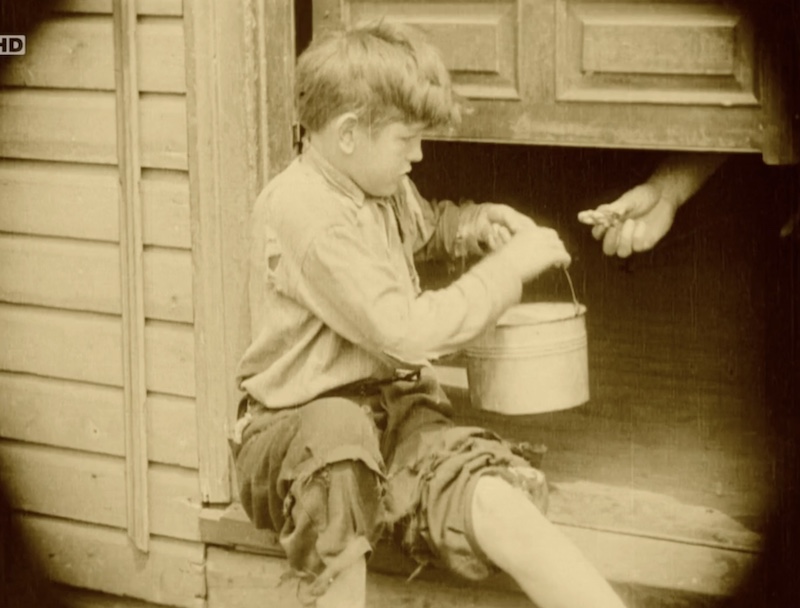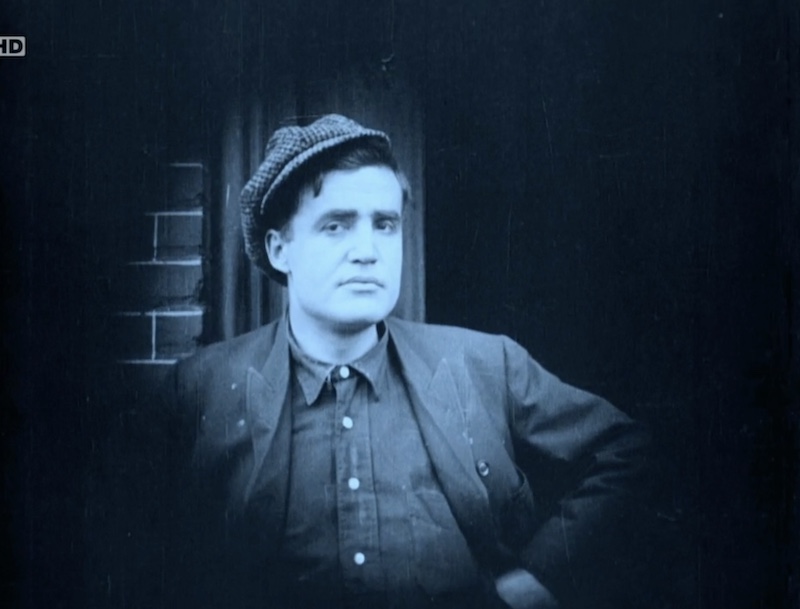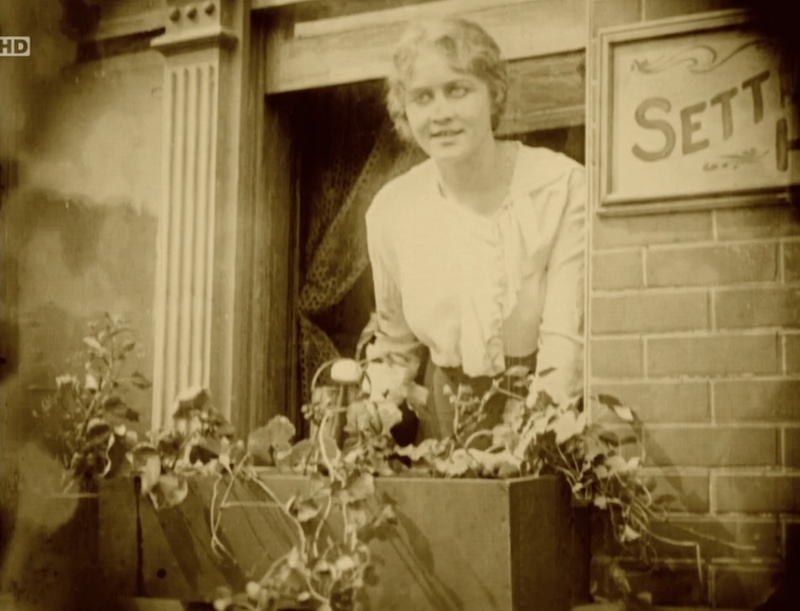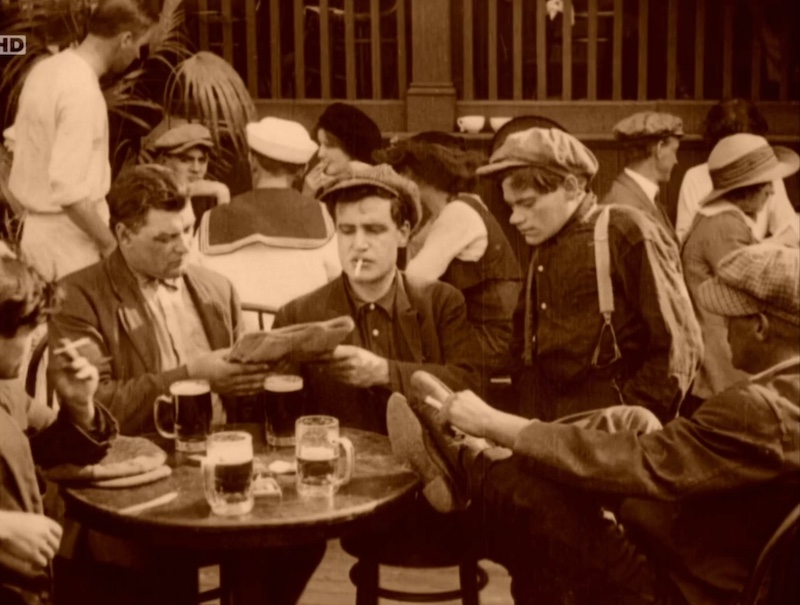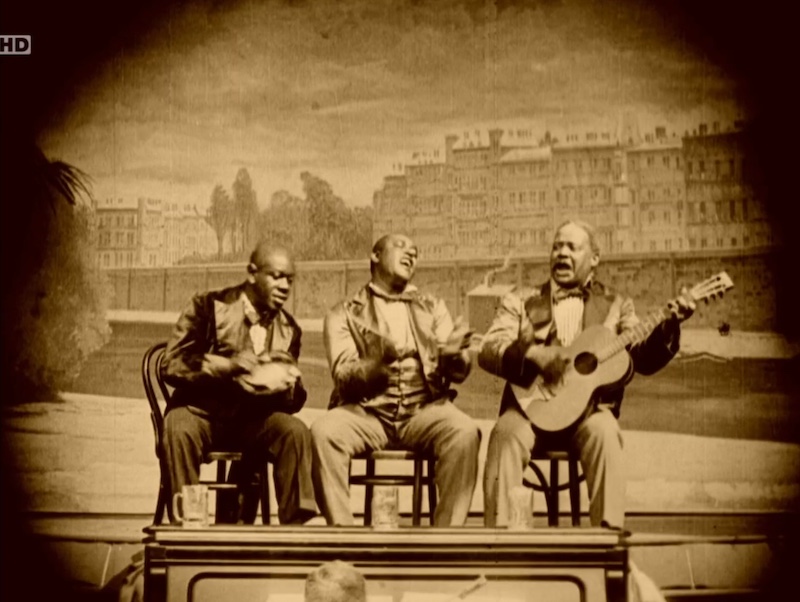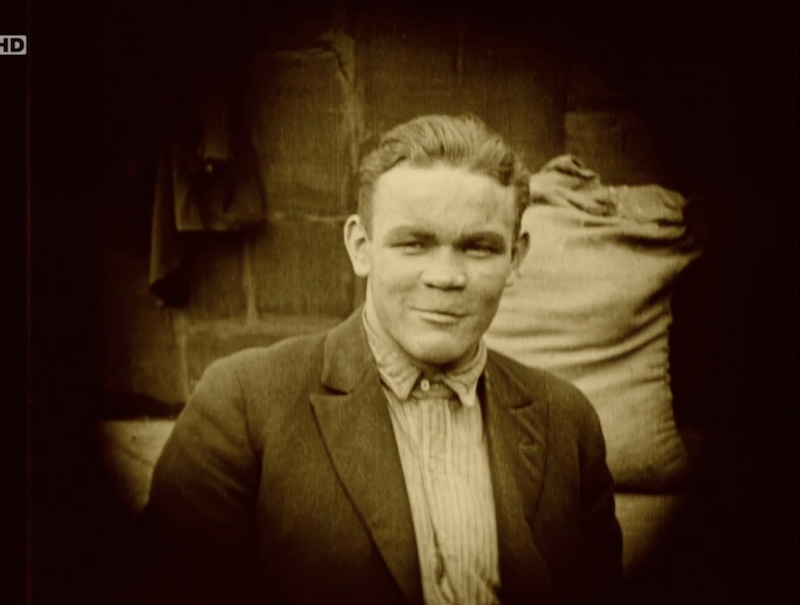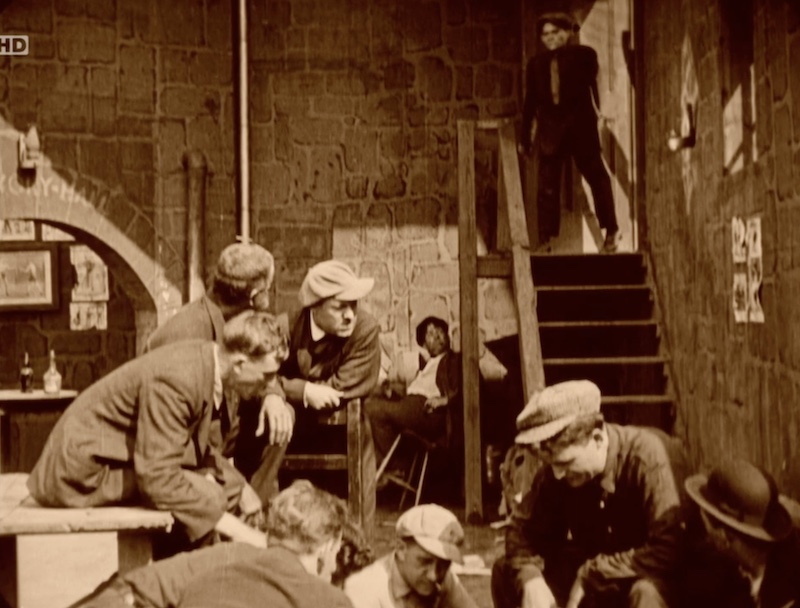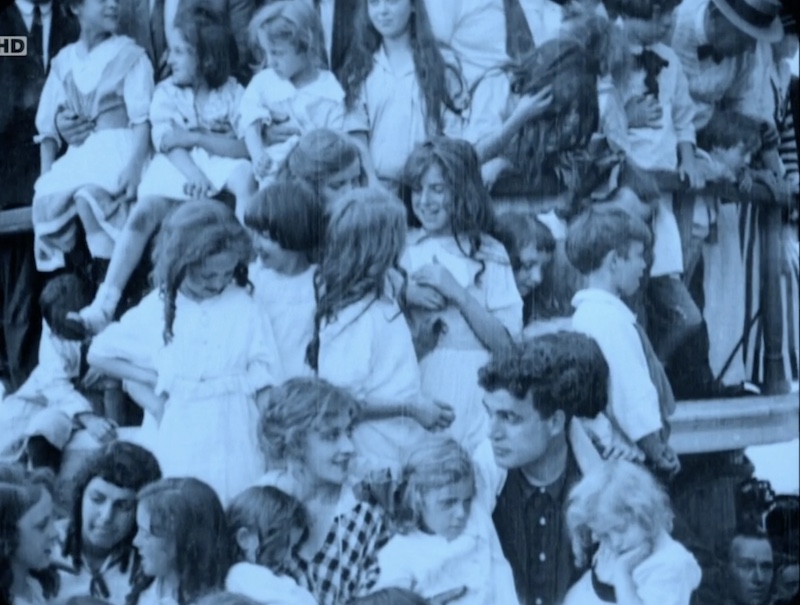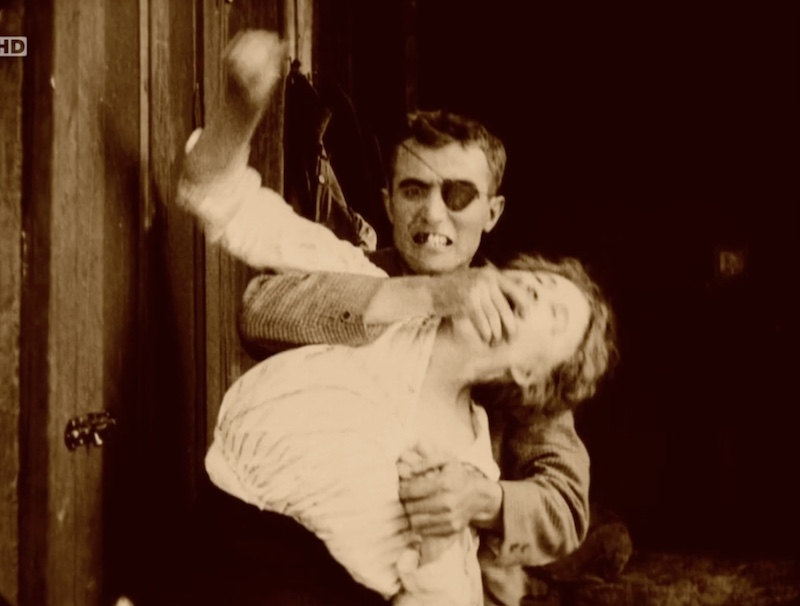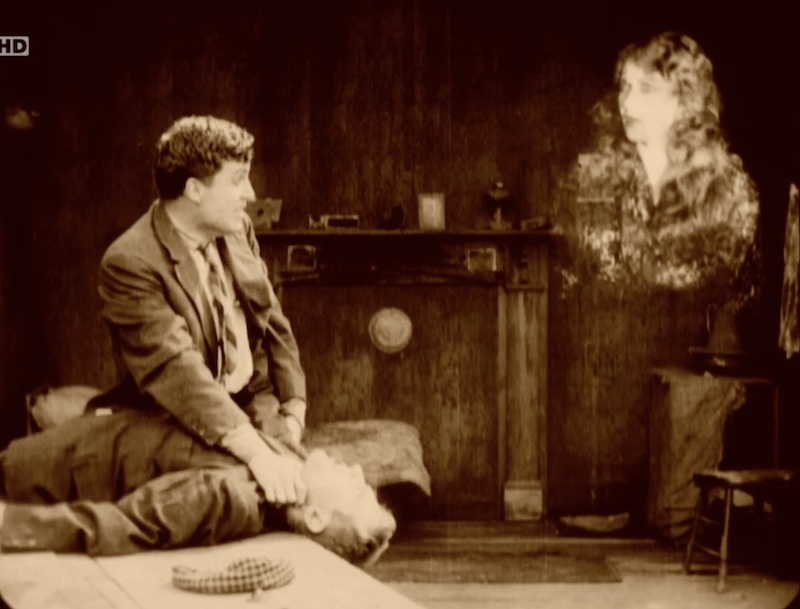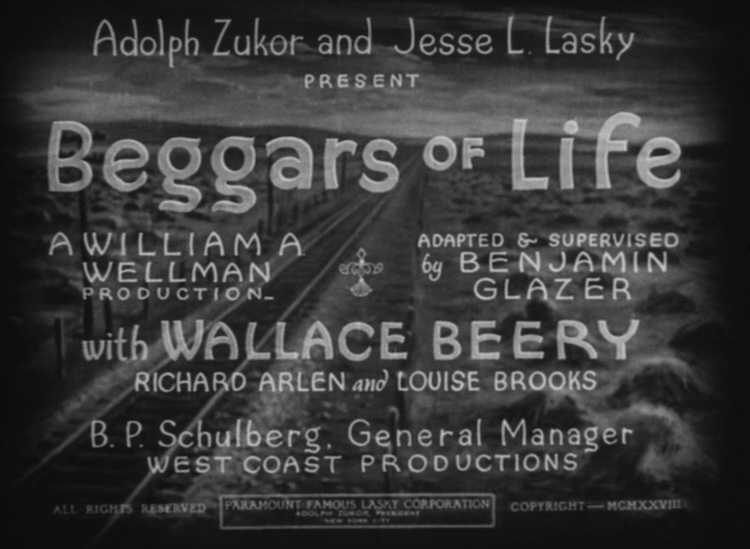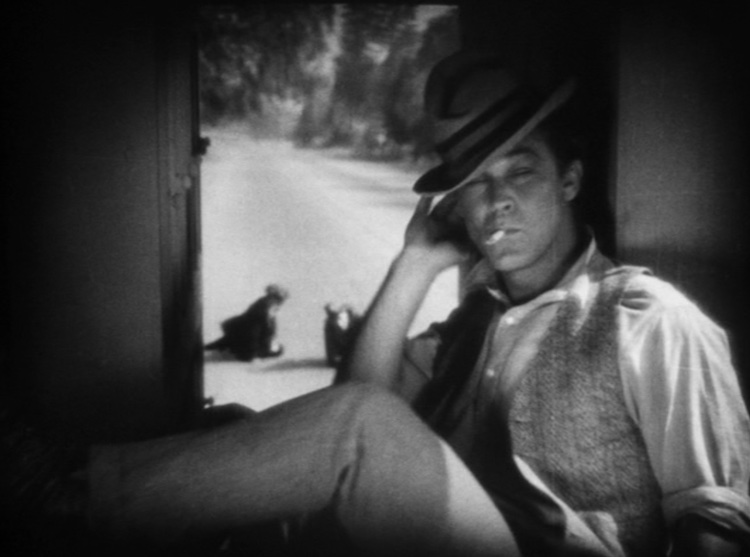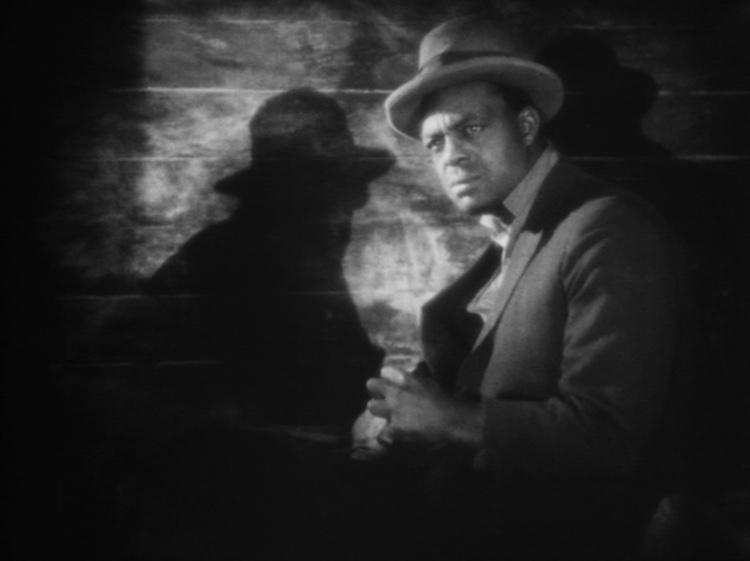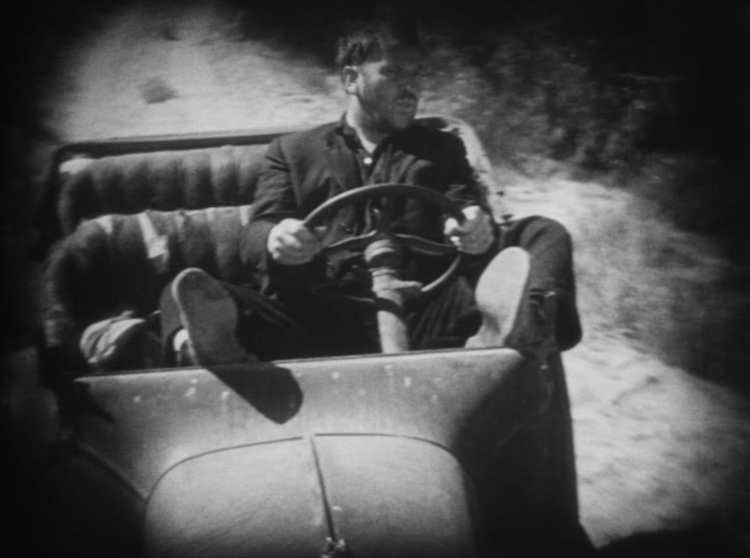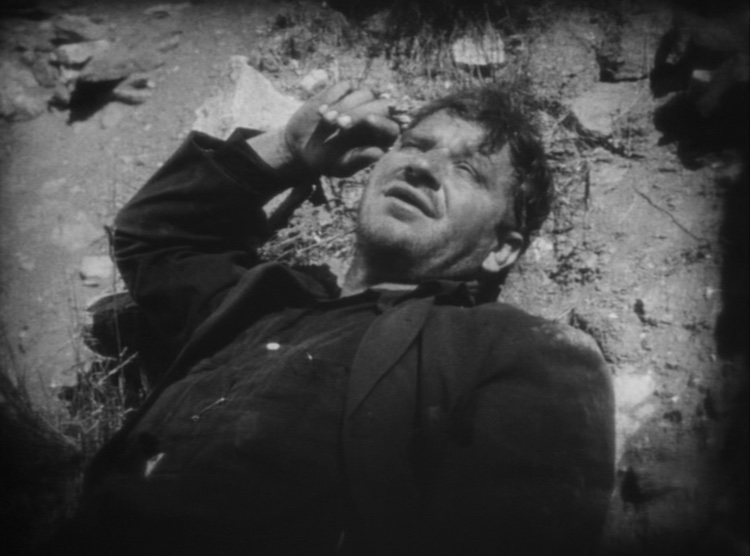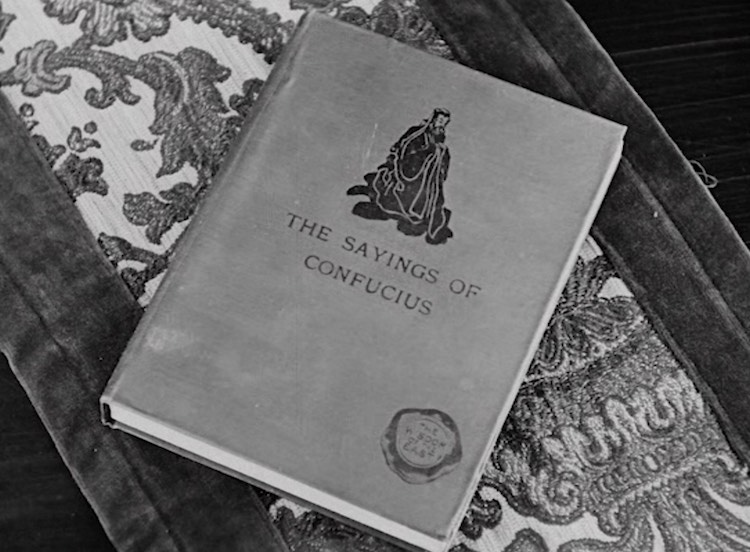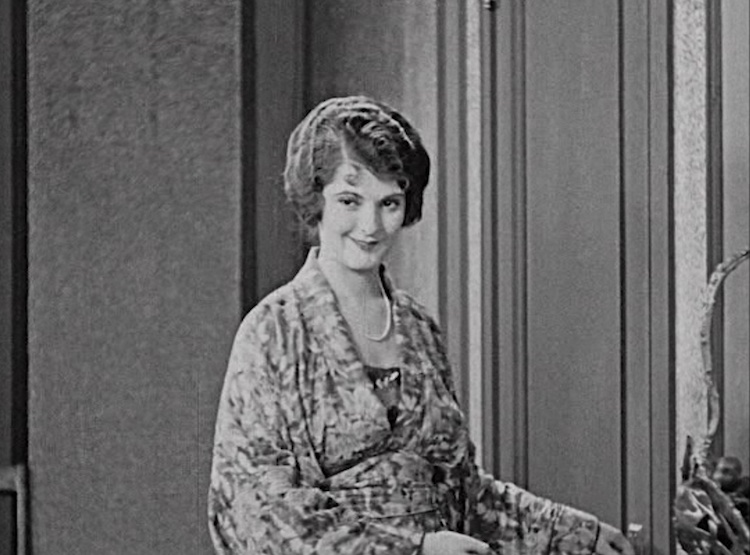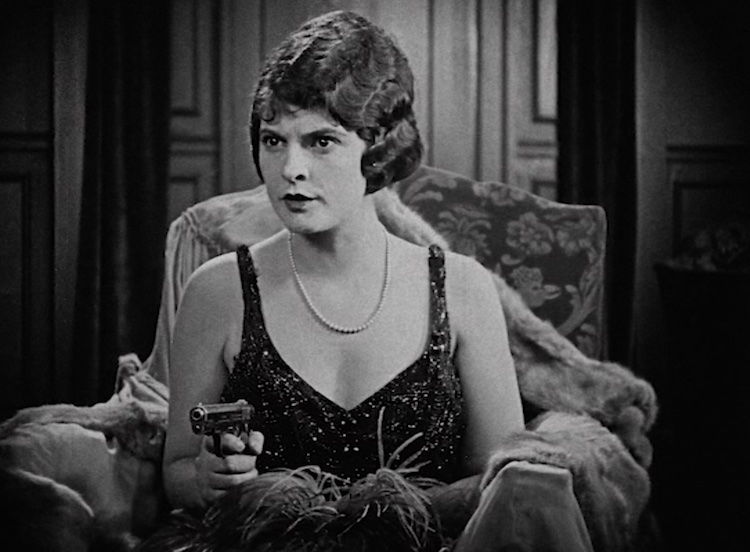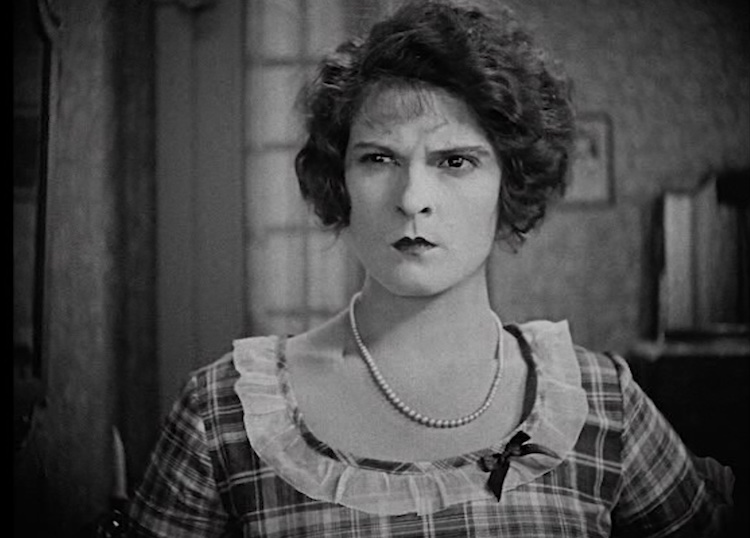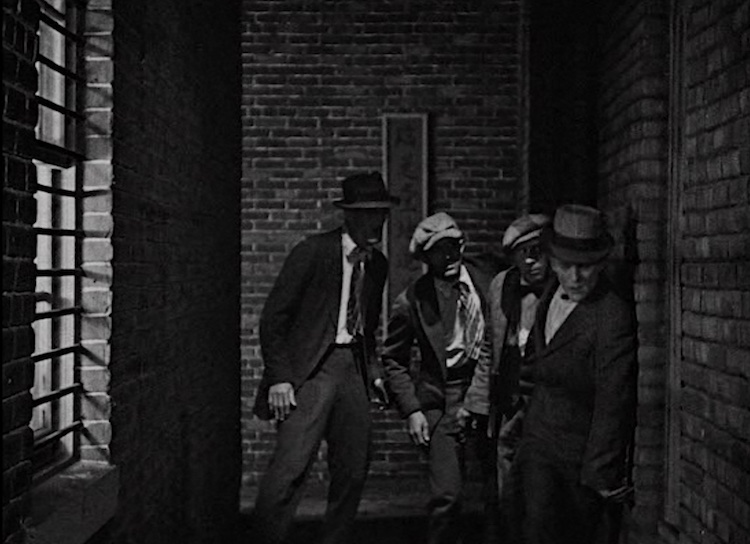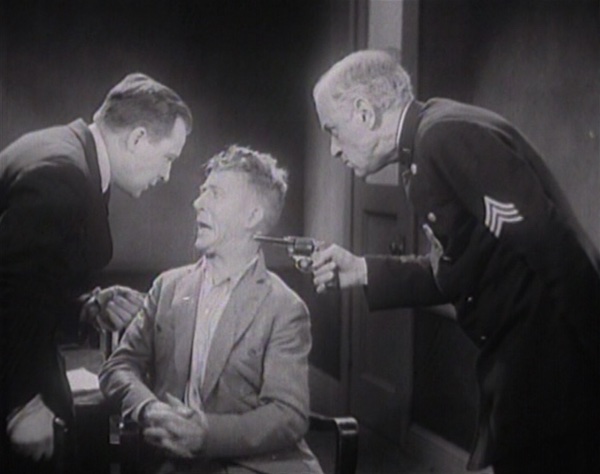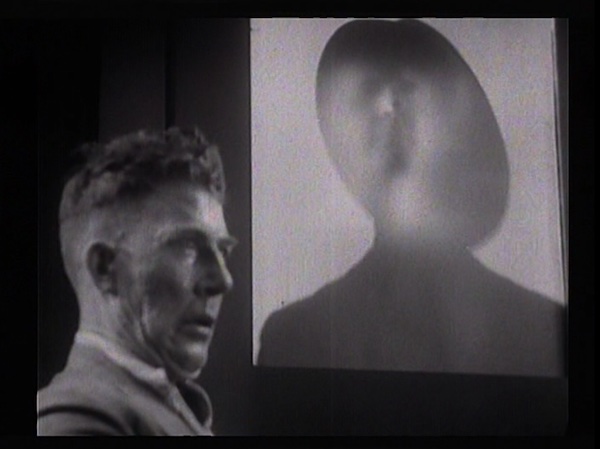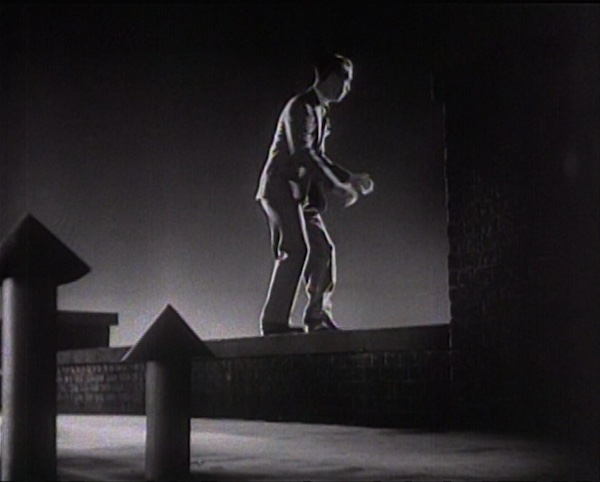Movie Reviews - Silent posts
Sunday March 31, 2024
Movie Review: The Regeneration (1915)
WARNING: SPOILERS
A lot of the tropes of early gangster flicks are here. I’m assuming they began here since there’s not much before here.
Start with those tin pails for beer drinking and transportation—the original growlers—which turn up in the Frankie Darro scenes of “The Public Enemy.” That’s more historical convention than movie one, but it’s still cool that “Public Enemy” got the historical details right.
We get a version of the 1904 General Slocumb disaster, New York’s biggest mass killing before 9/11—as seen in the 1934 Clark Gable gangster flick “Manhattan Melodrama,” the movie that ended John Dillinger’s life.
How about a hunchback/little person as attaché to the gangster? He turns up as Humpy (John George) in “Outside the Law” (1920) and Miller (Snitz Edwards) in “The Public Enemy” (1931), except those guys were snitches for the bad gangsters. Here, Hughy the hunchback helps redeem the gangster hero, Owen (Rockliffe Fellowes), not only by encouraging his relationship with the social reformer Marie (Anna Q. Nilsson), but by killing the bad gangster himself.
Oh right, the basement hideout. It’s an almost exact replica of the hideout the Dead End Kids will use in “Angels with Dirty Faces.” Or theirs was a replica of this.
Most important, anticipating “Public Enemy” and “Angels with Dirty Faces,” “The Regeneration” gives us a gangster’s coming-of-age story as sociological study. We see Owen at ages 10, 17 and 25, with the child father to the man. He’s not a bad kid, he’s just given a bad break. Or a series of them. Or a series of awful ones. The beginning of this movie should be required viewing for libertarians. To show them what life was like before any sense of governmental regulation. To show them what dumb shits they are.
Drinking beer
This part: When Owen’s mother dies, the authorities arrive to cart away her body and … that’s it. That’s all they do. “Hey, what about that barefoot, 10-year-old boy (John McCann) in rags in the dilapidated apartment upstairs? 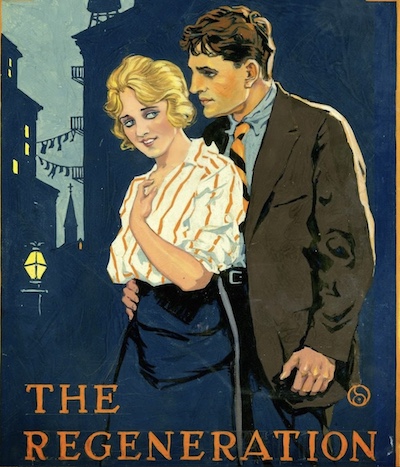 Any reason for us to check on him?” “Nah, he’ll get by.”
Any reason for us to check on him?” “Nah, he’ll get by.”
Except it’s not exactly by the kindness of strangers. Maggie, a fat neighbor lady, muses a bit, then says to her drunk husband, Jim, “The kid’s alone now. I’m going to bring him in here.” Is it a kind gesture? Not really. Owen is immediately put to work and slapped around. He’s sent to fetch more tin pails of beer for the old man and his drunk friend. He’s less son than servant.
“And then years pass,” we’re told via title card, “and Owen still lives in a world where might is right—and where the prizes of existence go to the man who has the most daring in defying the law…” That’s what the title card says. What the movie shows us? On the waterfront, when a bully mocks a hunchback, Owen, now 17 (Harry McCoy), beats him up. It’s not exactly “defying the law.” Not exactly gangster stuff.
To be honest, Owen is never much of a gangster. We’re told he becomes a gang leader at 25 because of “a complete assortment of the virtues the gangsters most admire.” And what are those? That we see? Well, he bullies one guy into paying for their beers. And he drinks beer. That’s about it. He’s not far off from Associate Justice Brett Kavanaugh.
But DA Ames (Carl Harbaugh) pledges to sweep the city clean of such trash! One night, he attends dinner with the Deering family, which lights the imagination of social butterfly Marie (Ann Q. Nilsson), who declares she wants to go seean actual gangster. It’s socialite-slumming a la 1929’s “Chinatown Nights,” but Ames proves an unheroic chaperone. His picture’s been in the paper, the gang doesn’t like it, and when he has to go back for Marie’s wrap he’s set upon by the gang. Marie is horrified. Her eyes plead with Owen—who’s been making eyes with her—and win. Owen stops the bullying. The next thing you know, Marie is involved in the social reform movement at the Settlement House.
At this point, the movie turns episodic. Marie lets the gangsters join their group aboard a boat, and Skinny (William Sheer), Owen’s eyepatching-wearing right-hand man, tries to impress some girls. They remain unimpressed, so he flicks his cigarette into a pile of ropes. It starts a fire. This is the General Slocumb-esque disaster, and we get several minutes of panic while the patina of the film changes from yellow to red.
Then the Settlement House has a problem with a brutish husband, so they send the little bespectacled guy. Nope. So Owen goes. That works. Afterwards, he sees GOD IS LOVE on the House chalkboard and leaves. He knows he doesn’t belong in such a place.
But Marie thinks he does. She goes to the gang’s hideout, where he’s doing his usual midday drinking, and points out a nearby drunk sleeping it off, with insects crawling on his face. Is that what he wants for himself? That’s when Owen joins the social reform movement while Skinny takes over the gang. Done and done.
Except Skinny ain’t exactly smart. His first act as gang leader? Knifing a cop. His second act? Pleading with Owen to hide him. The third? Attempting to rape Marie. Making a lot of friends, isn't he?
Why Owen hides Skinny is interesting if you’re a Cagney fan. It’s more than gang loyalty. Owen flashes back to when they were younger, getting chased by the cops, and Skinny trips and is caught—but doesn’t squeal. It’s basically Rocky and Jerry from “Angels with Dirty Faces.”
Though the cops don’t find Skinny, Marie finds his cap, can’t believe Owen lied to her, and retires crying. The DA, who’s shown up again at the 11th hour, cackles with glee, while Owen—and, again, shades of Father Jerry—visits a priest. Meanwhile, Marie overcomes her grief and tries to find Owen. Instead, she finds the gang, who eye her menacingly. Then Skinny tells her Owen is upstairs. He ain’t.
The real hero is the hunchback. He alerts the cops, he alerts Owen to Marie’s predicament, and Owen goes after Skinny. Fleeing, Skinny fires at Owen, misses, and hits Marie hiding in a closet. In the hospital, surrounded by Owen and others, Owen vows vengeance, but she points to an image floating above her bed in Biblical tablet form:
VENGEANCE IS MINE, SAITH THE LORD
ROMANS 12-13
I think she’s saying let God handle it.
He seems to abide by her dying request. Tossing the gun aside, he goes after Skinny to bring him to justice rather than kill him. He comes in through the skylight (another great early trope), they fight, and just as Owen is about to strangle Skinny he sees the distraught image of Marie counseling goodness.
So how does Skinny get it? Surrounded by cops, he tries to scale the clothesline to another building, but the hunchback spots him and shoots him down. Then he and Owen commisserate over Marie’s grave.
Just who is this diminuitive hero who keeps doing the right thing? I mean, who is the actor playing Hughie? I don’t know and I can’t find out. Nobody seems to know. He’s not listed in IMDb, Wiki, AFI. Go back via newspapers.com to contemporary reviews and still nothing. Somebody somewhere must know, I’m just not finding it.
Irish rose
Apparently the film was lost for many decades until it was ressurected (or, you know, regenerated) by the Museum of Modern Art in the 1970s. Not sure how/where they found it. The movie is of particular interest not just because it’s an early gangster film, and not just because it’s one of the first features from famed director Raoul Walsh, but because it was filmed on location and often used Lower East Side gang members as extras. It’s truly historical.
Nilsson, an early Swedish import, had a long career, appearing in more than 200 films—mostly in the 1920s, when she was a star—but her best-known modern role is probably as one of the silent-era “waxworks” playing bridge with Norma Desmond in “Sunset Blvd.” Her last film was an uncredited part in “Seven Brides for Seven Brothers.” She died in 1974, age 85.
And the fellow with all the extra “e”s? Rockliffe Fellowes of Otawa, Canada had a shorter career (62 credits) and a shorter life (he died in 1950, age 65), but I was delighted to find out I’d seen him before. He played Joe Helton, a retired gangster, whose daughter is kidnapped by a rival in the great Marx Bros.’ film “Monkey Business.”
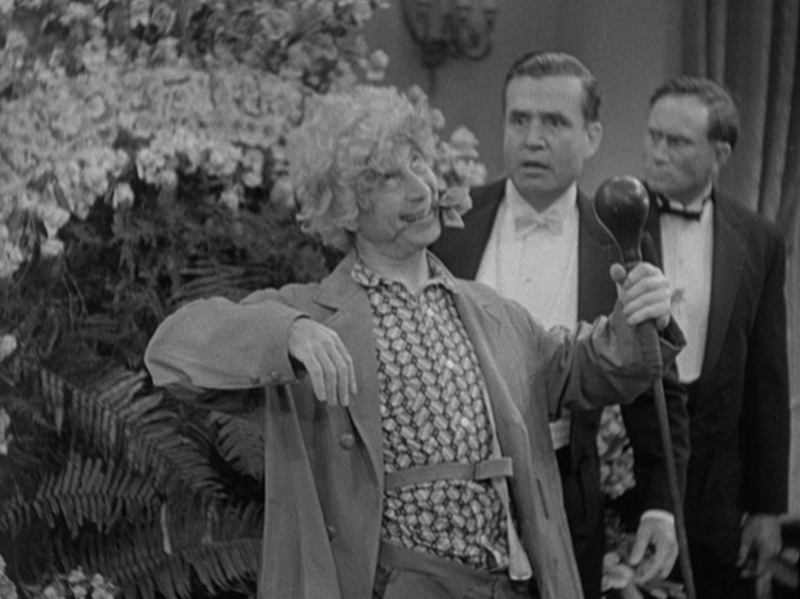
He’s not a bad straight man, but for some reason, two years later, his film career was over.
At the end of this film, over the graveyard, Owen says Marie was the noblest and purest thing he ever knew, and then calls her “my Mamie Rose.” That sounded off to me. Made her sound like his mother. But that’s actually the title of the memoir on which this movie is based, published in 1904 by Owen Frawley Kildare. Wait, not novel? Memoir? Yes, Kildare claimed Owen’s story as his own, though some say he was born to wealth in Maryland but fled and became a newspaper hawker and itinerant everything before becoming “the Kipling of the Bowery,” as newspapers of the era called him. “My Mamie Rose” wound up being adapted for the stage in 1908, though Kildare didn’t much like the actor playing him. At least he didn’t have long to fret. Shortly thereafter, he fell in the subway, suffered a series of breakdowns, and in 1911 died in the Manhattan state hospital for the insane on Ward’s Island. In one newspaper, news of his death is next to an article on the continued incarceration of the murderer Harry K. Thaw. Does that name sound familiar? Yep: “Ragtime,” which was the last screen role for James Cagney. Full circle.
SLIDESHOW
Friday February 23, 2024
Movie Review: Safety Last! (1923)
WARNING: SPOILERS
Last month my wife and I went to see Harold Lloyd’s “Safety Last!” at the Paramount Theater with its famed Wurlitzer Organ. Silent Movie Monday used to be about once or twice a month and now it’s just four times a year, but the place was packed. Maybe they need to do more of these?
Oddly, I think I’ve only seen “Safety Last!” on a big screen. The first time was in 2006 with my friend Jessica Thompson, at, I believe, the Heights Theater in Minneapolis—a renovated old-timey theater near a renovated old-timey Dairy Queen. I love that area.
I’m going to say something sacrilege here, and apologies in advance: I’m not a huge Harold Lloyd fan. I realized that watching this a second time.
Apologies
 Lloyd is usually listed as the third great player in the great silent film comedy triumverate—after Chaplin and Keaton. And, yes, he’s not at the same level as the other two, but for me it’s more. They make me laugh, he doesn’t. Much. And I like the Tramp. I like the Buster character. I identify with those guys. I don’t really like the Harold character. I like his haplessness and stunts. But I don’t like the way he strives.
Lloyd is usually listed as the third great player in the great silent film comedy triumverate—after Chaplin and Keaton. And, yes, he’s not at the same level as the other two, but for me it’s more. They make me laugh, he doesn’t. Much. And I like the Tramp. I like the Buster character. I identify with those guys. I don’t really like the Harold character. I like his haplessness and stunts. But I don’t like the way he strives.
Who is the Harold character? In “Safety Last!” he’s a kid from South Bend, Indiana, who goes to the big city while promising the girl back home, AKA The Girl (Mildred Davis), that they’ll get married when he makes his fortune. She responds “You’d better not fail!” and he gets a worried look on his face. That’s fun, but for the rest of the movie he pretends he’s something he’s not, and that’s less fun. He puffs himself up. In doing so, he screws over friends. Sometimes he screws over friends for no reason whatsoever.
Early on, he sends The Girl a lavalier. He can’t afford it, but he hocks the phonograph without telling his roommate and pal “Limpy” Bill (Bill Strother). Is the phonograph Limpy’s? Is it theirs? Maybe it’s the landlord’s, to whom they owe money, and from whom they hide behind hung jackets? (That’s an early, clever bit.) We never know. But he does it without consulting anyone.
At one point, he meets a friend, a cop, then brags to Limpy that he’s got such an “in” with the police that he can knock over that cop over there. Go ahead, he tells his friend. I’ll get on all fours behind him, and you push him over. Of course, by the time they do this, it’s no longer his friend but a cop Harold doesn’t know (Noah Young). And that cop spends the rest of the movie in pursuit of poor “Limpy” Bill.
All this time, too, Harold's been lying in letters to The Girl back home. He tells her he’s doing great at De Vore Dept. Store—that he’s a general manager or some such—when he’s bottom rung. He's a sales clerk. He lies so well, in fact, and starves himself and screws over his friend so much, in order to send the jewelry, that The Girl’s mother urges her to visit before she loses such a prize catch. When she shows up, he works overtime pretending he is what he isn’t.
Then we get the scheme that makes the movie famous. He overhears the general manager say he’ll give a $1,000 bonus to anyone who can concoct a scheme to get people into the department store. At that point he remembers “Limpy” Bill scaling the outside of a building to escape the enraged cop, and he makes a deal with Bill, 50-50, for Bill to do the same at De Vore. That’ll draw a crowd! And it does. Harold will start it out, then swap places with Bill on the second floor. Except the cop hears about the stunt, suspects it’s Bill, shows up, and chases poor Bill around. So it’s no go on the second floor, and then on the third a bunch of secretaries are watching. Etc. Harold winds up scaling all … is it 12 stories? … despite pigeons, a dog, a mouse, construction guys, and an errant rope.
And he gets The Girl.
Here's a question that doesn't need askng but I can't help myself: Do any of the gawkers actually go into the store?
All along the clocktower
Harold Lloyd hanging from the clock is of one of cinema’s most indelible images, inspiring homages from the likes of Jackie Chan and Martin Scorsese. It’s also an apt metaphor for life. We’re all just hanging from a clock tower. And every moment, we’re slipping, slipping.
I like The Girl. Mildred Davis, who became Lloyd’s real-life wife, looks amazingly modern. You put her, sans cloche hat, into the 2020s, nobody would blink.
I also liked the fact that there are several Black extras, including a woman with a baby, and it doesn’t get embarassingly racist.
I just wish I liked the Harold character more.
Saturday August 12, 2023
Movie Review: The Musketeers of Pig Alley (1912)
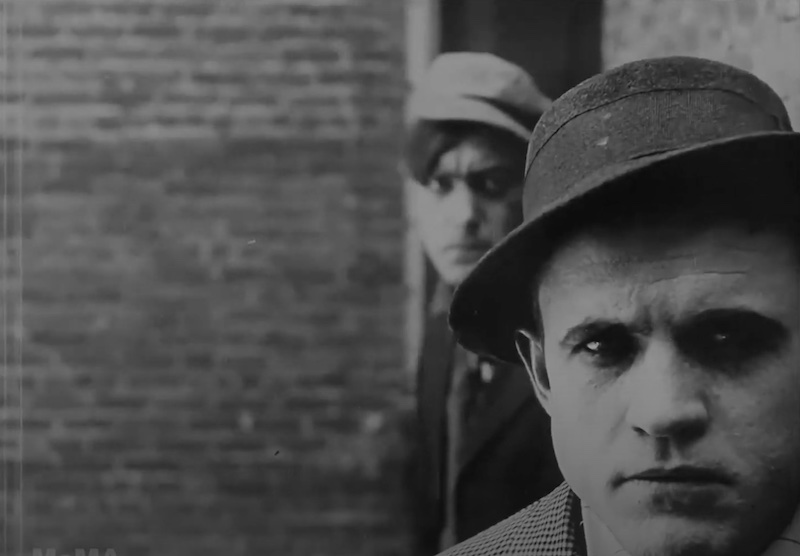
The radical shot: Booth, foreground, with Harry Carey behind him.
WARNING: SPOILERS
In the intro to “The Musketeers of Pig Alley” on the Barrymore Film Center’s YouTube channel, executive director Tom Meyers mentions that Elmer Booth as the Snapper Kid is reminiscent of James Cagney—20 years before Cagney revolutionized the gangster role in “The Public Enemy.”
It’s a not-bad comparison. Both men are short, tough, energetic, and with a moral ambiguity about them. They’re bad guys but with humanity. At a tense moment in a back alleyway, Snapper is startled when someone brushes past him and he raises the gun inside his coat pocket. When he sees it’s only a Chinese laundryman, he laughs. At himself.
One difference? We immediately like Cagney. Not true with Booth’s Snapper Kid. And I think for this reason: “Musketeers” begins with the civilians.
Act I:
- A poor musician (Walter Miller) leaves his girl (Lillian Gish) and her mother (Clara T. Bracy) to make money elsewhere
- A local gangster (Booth) takes a liking to the girl, makes a play, but is rebuffed
- The mother dies
- The musicians returns with money but is mugged by the gangster
No Cagney movie begins that way. In “The Public Enemy,” we never get the backstory on the bartender Cagney slaps around, or the cop he kills after the fur heist goes bad, or poor Kitty with the grapefruit. The story begins with him as a boy, and how he became what he became. Our sympathies are immediately with him.
When do our sympathies turn toward Snapper? With a moment, I’m embarrassed to say, that I missed.
Behind barrels
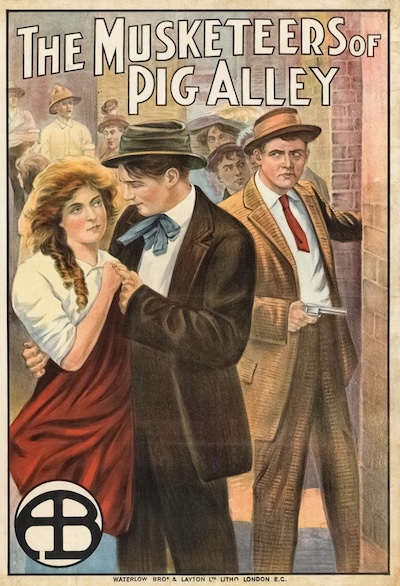 Directed by D.W. Griffith for Biograph Studios, and filmed by G.W. (Billy) Blitzer, “The Musketeers of Pig Alley” is considered one of the first gangster movies, revolutionary in its camerawork, but by modern sensibilities it’s hardly a movie—just 17 minutes long. To get a true sense of its impact, you’d have to watch a bunch of 1910-11 movies before springing this on yourself.
Directed by D.W. Griffith for Biograph Studios, and filmed by G.W. (Billy) Blitzer, “The Musketeers of Pig Alley” is considered one of the first gangster movies, revolutionary in its camerawork, but by modern sensibilities it’s hardly a movie—just 17 minutes long. To get a true sense of its impact, you’d have to watch a bunch of 1910-11 movies before springing this on yourself.
The Museum of Modern Art tells us why it's a picture from the revolution:
The story unfolds in the cramped confines of ramshackle rooms, crowded sidewalks, and alleyways, the claustrophobia heightened by the camera’s tight framing. … A shot toward the end—among its most radical—in which The Snapper Kid brings his face up to the camera and peers out as if he is casing the movie theater itself, would have felt harrowing for those [audience members] contending with gang presence in their own lives.
After Act I, the musician is determined to get his money back. Well, “determined.” He mostly mills about the neighborhood looking forlorn. Meanwhile, a girlfriend convinces “the Little Lady” (Gish) to go to a local event, “Grand Dance of the Jolly Three,” where men and women congregate on opposite sides of the room like at a ’50s sockhop. There, the Snapper Kid eyes her again while a rival gangster (Alfred Paget) asks her to dance. She declines but says yes to a drink. In the next-door saloon, drinks arrives, he shows her a postcard, and then Snapper shows up and slaps the drink out of her hand.
Now we have a gang war. Because the two men are fighting over the Little Lady? No. Because the rival tried to drug her. That’s the detail I missed. The postcard was misdirection and it not only worked on the Little Lady but me; I missed him slipping a powder into her drink*—but Snapper didn’t. He came to the rescue.
* I assume this is less allusion to “date rape”—a term that wouldn’t exist for more than half a century—than “white slavery,” which was all over the newspapers in the early 1910s, particularly after the passage of the White Slave Traffic Act of 1910, AKA the Mann Act.
Now the movie begins a tense buildup as the two gangs mill about on the crowded street outside, and in the saloon, and in a back alleyway. They seem to be searching for each other or looking to get the upper hand. Eventually, the rival gang simply hides in the alleyway—behind barrels (!!!)*—and we get our gun battle.
* One thing I love about silent films: the unironic use of tropes I’ve only experienced ironically or in cartoons.
Amid the smoke, Snapper backs into a doorwell where the musician has been cowering, and for some reason—anticipating the cops’ arrival?—starts to put his gun in his jacket pocket, where the musician’s money is conveniently located. There’s a struggle and the musician lurches away—with the money. Does Snapper know he took it back? I never got that sense. He’s mostly running from the cops now. Which is why he barges into the Little Lady’s apartment—he needs her as an alibi. This is when she tells him the musician is her man. I love how Snapper takes it. What—HIM? Over ME? Seriously? OK. Well, good luck with all that, I guess. Really, though? You’re serious? Wow, what a screwy world.
But when a cop grabs him in the hallway outside, the couple gives him an alibi. As the title card reads: “One good turn deserves another.”
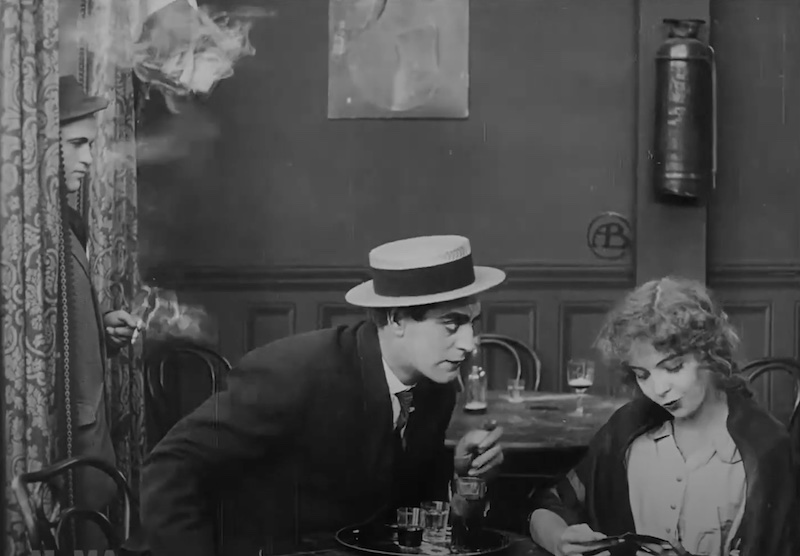
The moment I missed.
Men don’t leave
The ending is ambiguous. The cop leaves, Snapper smokes a cigarette in the hallway, and then a hand is extended from offscreen, flapping dollar bills enticingly, and the title card tells us: “Links in the system.” Social commentary, one assumes. Snapper’s circumstances will always drag him down. Then we get a shot of the couple, embracing and motioning vaguely toward the future.
If that ending seems abrupt, well, the director was busy. “Musketeers” is one of more than 70 films Griffith directed in 1912. Yes: 70. No wonder he mastered his craft. Whatever the new industry is, kids, get in on the ground floor.
Griffith knew how to pick or nurture talent, too. Snapper’s silent secondary is Harry Carey, who had a long, distinguished career as a supporting player, mostly in westerns, while a fellow musician our hero greets is Lionel Barrymore—Mr. Potter from “It’s a Wonderful Life.” Gish was only 19 at the time but became one of the screen’s first big movie stars—and then lasted. Most her career, sure, was silent, but she kept getting pulled back in: “Duel in the Sun,” “The Night of the Hunter,” “Sweet Liberty.” She died in 1993, age 99.
The male leads didn’t last so long—in life. Booth was killed in 1915 when he was a passenger in a car driven by a supposedly inebriated Tod Browning, the future horror auteur. Paget, the rival gang leader, a Brit who fought in the Second Boer War and served as an instructor in Canada in WWI, died in 1919 of malarial fever … in Winnipeg? I didn’t even know that was a thing. Miller, our romantic lead, kept acting in bit parts into the sound era but died of a heart attack in 1940, age 48. Even Clara T. Bracy, whose elderly mother barely lasts here, lived longer than any of these guys.
The title is nowhere in the film, by the way. The gang never refers to themselves as “Musketeers” and the area is never called “Pig Alley.” But it’s a great title. It pops.

A 1912 Tampa theater ad. Wouldn't mind seeing any of these but one wonders about the descriptions. “Showing that radical action is necessary to eliminate them,” for example, is a bit of a stretch.
Friday April 28, 2023
Movie Review: Chinatown Nights (1929)
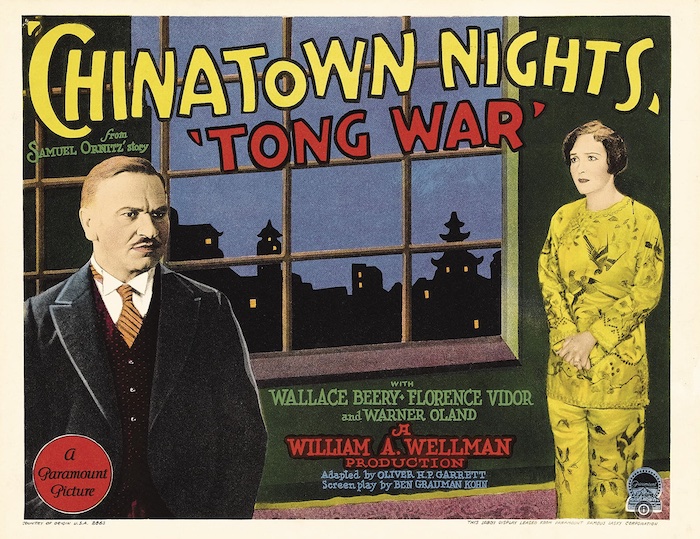
WARNING: SPOILERS
It begins with one of those old-fashioned traffic signs—the word STOP comes up as the word GO retracts—and intentionally or not (not), it speaks to the movie’s troubled production. “Chinatown Nights” began as a silent film, but morphed into one of the first “all-talking” pictures, mostly through dubbing. And the dubbing is awful—out of synch and nonsensical. In these early traffic scenes, for example, we barely hear traffic. Instead we hear, very loudly, an unseen newsboy shouting “Extra, extra, read all about it!” And then suddenly we don’t hear him at all. We just hear a Chinatown tour bus guide’s schpiel about “sacred joss houses” and “ancient secret orders of the great Tong.” What happened to the newsboy? Where’s the traffic noise? It’s like an odd dreamworld. I felt a little nauseous trying to make sense of it.
Is this the movie that nearly ended Wallace Beery’s career? It was, at least, his first sound production, and sound is why Paramount dropped him. His voice was resonant, but, they felt, too deep and slow. So MGM’s Irving Thalberg picked him up and immediately made him one of the biggest stars of the early 1930s. (MGM also picked up the Marx Brothers after Paramount dropped them. Go know.)
Either way, “Chinatown Nights” did end Florence Vidor’s career, though not for any Lina Lamont reasons. Apparently she loathed what sound did to the moviemaking process, so she didn’t even bother to dub her own voice here; Nella Walker did that. And yes, she was Vidor as in King Vidor, her husband from 1914 to 1926. She did OK on the rebound, though, marrying famed violinist Jascha Heifetz in 1928.
Despite the movie’s troubles, it’s still kind of fascinating. I would love to see a crisp copy on a big screen rather than—as I did—a small muddy copy on my computer. It’s William Wellman, after all, making a gangster flick two years before “The Public Enemy.” How fun is that?
Dueling Shakespeare
Isn’t it also a kind of gender-reversed “Blue Angel”? The society dame brought low by the gangster. Though with a happy ending, if you can imagine.
Joan Fry (Vidor) is on a bad date with the drunk and handsy Gerald (Freeman Wood) when she becomes intrigued by the Chinatown tour bus. She also figures that, with Gerald, a public bus is safer than a private limo:
Gerald: You know, Chinatown is all a fake.
Joan: Then you should feel right at home.
The tour bus winds up running into a Chinese falldown artist. Except no, he’s actually dead, the victim of a brewing Tong War between Chuck Riley (Beery) and Boston Charley (pre-Charlie Chan Warner Oland, in yellowface). It’s Riley who shows up and orders the tour bus to scram, but Joan’s feisty so she sticks around. Then the cops show up and question her. Love that. There’s a dead body, there’s a known gangster, but wait, who’s this society dame? Maybe she had something to do with it!
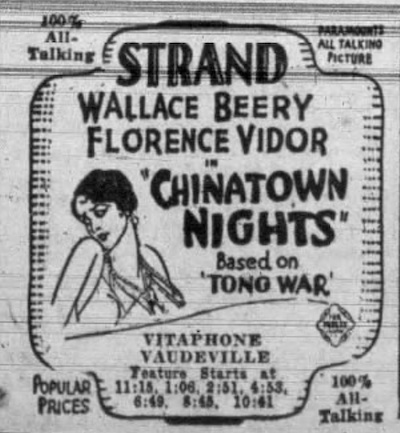 After that, it’s late, there are no taxis, and men are being killed on the streets. Riley is the devil she knows. “Where are you taking me?” she asks, worried. “You’re following me,” he responds correctly.
After that, it’s late, there are no taxis, and men are being killed on the streets. Riley is the devil she knows. “Where are you taking me?” she asks, worried. “You’re following me,” he responds correctly.
Riley has a room above his nightclub with a giant war map along one wall, and a Chinese assistant, Woo Chung (Tetsu Komai), who doesn’t seem to do much. For her safety, Joan is locked in an adjacent room, from which she: 1) tries to escape; 2) emotes wide-eyed behind one of those speakeasy windows; 3) browses the bookshelf. There she finds a volume of Shakespeare with “C. Riley, Class of 1908” written on the title page. We get a nice scene of dueling quotes. She points out this one to Riley:
Upon what meat doth our Caesar feed
That he is grown so great?
He counters with “Richard III”:
Teach not they lips such scorn, for they were made
For kissing, lady, not for such contempt
Unlike the handsy Gerald, Riley doesn’t make a play, and in the morning she leaves reluctantly. Later, she returns to check out the Chinese Theater with society friends, who are already worried Joan might “go native.” Yes, they say that. It’s 1929.
By this point, a stuttering reporter, Williams (Jack Oakie), has instigated a meeting at the theater between the two Tong gangsters (cf., the scheming reporters in “The Racket”), Joan and her friends get in the way, men are killed. There’s a great shot of her caught in the mayhem afterwards—pushed along the crowd like someone caught in river rapids. So it’s Riley to the rescue again, even though he sees her as a slumming society dame, “down here looking us over like animals in a zoo.” Cake-eaters like her and her friends would faint if anyone slapped them in the jaw, he says, at which point she dares him to do it. So he does. Hard. And she? She holds her cheek and looks at him with something like love brimming in her eyes.
Yes, they do that. It’s 1929.
The Shadow
After they spend the night together, we get a particularly odd sequence that speaks to the jerryrigged nature of this production, the unknowability of relationships, or some really bad editing. Or all three.
Joan is about to leave for good but in the hallway heading downstairs there’s another society gal whom we’d seen earlier laughing at a Buddha statuette. Here, near the Buddha, she looks back at Joan and intones in a sing-songy voice, “Going … my way?” For some reason, that line causes Riley to burst out laughing, which causes Joan to spin and stare at him with hurt and tears in her eyes. Then the camera is on him. He seems upset that she’s crying. Or stunned? Maybe he’s stunned because in the next shot she’s closing the door from inside and letting her coat drop slinkily, sexily, to the floor. Except in the very next shot, from a completely different angle, with completely different lighting, she’s beatific, eyes cast up, as she intones in a sing-songy way, “I’ve changed my mind, Chuck. I’m going … your way.”
(For oddly slow, sing-songy voices, cf., Harlow in “Public Enemy.”)
But will she? She’s used to getting her own way, and now she’s just a moll. When he attends a potentially dangerous Tong funeral he refuses to bring her along. So she drinks. So she’s a drunk. (It happens that fast.) And when the cops show up to end the Tong war, and Riley refuses to help, she blurts out something he’d previously mentioned to her—that the cops just need to demand papers from all the Chinese and deport those who don’t have them, and that would end things. For that betrayal, Riley throws her out. But to where? “I can’t go back uptown now!” she cries.
As weird as Wellman’s sing-songy molls are, he’s really good with street kids: Darro and Coughlan in “Public Enemy”; the whole bunch in “Wild Boys of the Road”; and Jack McHugh here. He plays “The Shadow”—two years before the creation of the radio character—a street urchin who works for Riley and warns him when danger’s afoot. I kind of flashed on Brandon Cruz a bit. He’s not just loyal but cool. At one point, Riley throws a pot at him and he doesn’t flinch. He’s also empathetic. By now Joan is an alcoholic getting kicked out of Chinatown bars, so he takes her to his basement apartment and sleeps on the floor next to her.
The next day, he tries to get Riley to take her back, and that’s when Riley throws the pot. A second later, the kid is shot on the streets outside, the latest victim of the Tong war Riley won’t end. The kid’s dying words are addressed to him.
“Beat it, Chuck,” he says. “The cops are coming.”
The movie’s not much, but that scene is poignant.
So long Tong
The wrap-up is quick and odd. Boston Charley dumps Joan in front of Riley’s place—alive, with a taunting note about rotting fruit pinned to her—and a doctor, dressed like a milkman, tells Riley the only way she’ll survive is if he takes her away from all this. So he does. Like that. Snap. “We’re going … your way,” he intones. Then it’s back to the tour bus in Chinatown, which Boston Charley now rules, while new cake-eaters mock the proceedings.
And that’s it. No comeuppance for Riley. To be honest, it’s kind of refreshing.
Again, I’d like to see a good-quality version of this. Even better if someone removed the bad dubbing and restored the intertitles. How does it work as the silent film it was meant to be?
Early Hollywood really loved the Tong wars, didn’t they? They’re all over these plots but begin to die off in the 1930s. What happened? I guess the exotic storyline morphed into familiar heroes (Charlie Chan) and villains (Fu Manchu). Would be interesting if a modern filmmaker, Chinese or Chinese-American, took up the mantle. Particularly if we got something historically accurate. If that’s even possible.
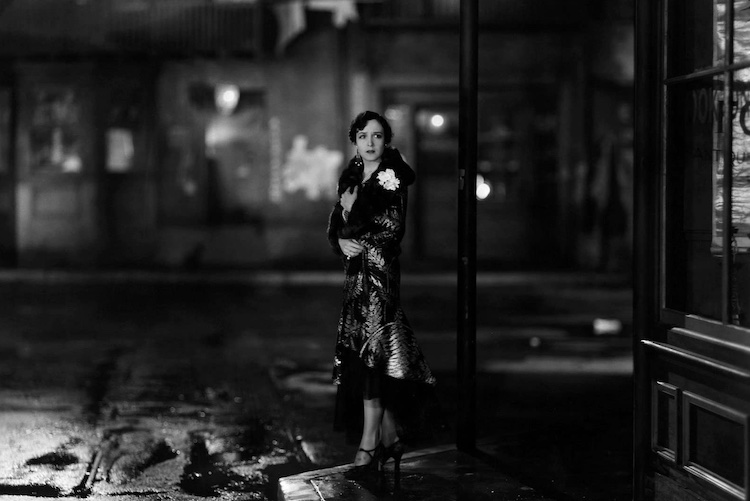
Ever had the feeling you wanted to go, but also had the feeling you wanted to stay? Florence Vidor stayed in the movie, then left the movies.
Wednesday April 12, 2023
Movie Review: The Racket (1928)
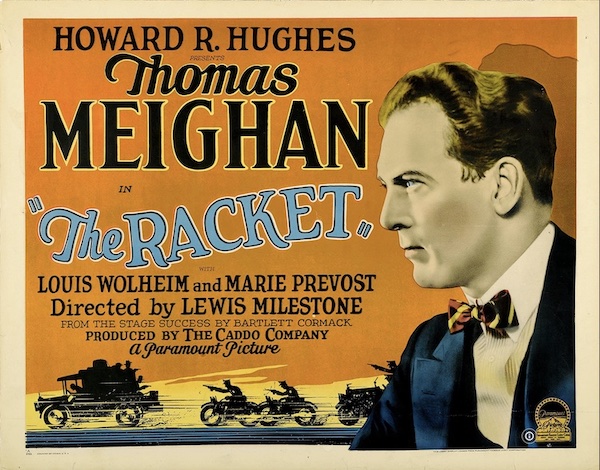
WARNING: SPOILERS
A cop and a gangster lock horns until the cop is reassigned to a tranquil precinct (because of corrupt ward politics), while the brother of the gangster is led astray by a woman. That’s this movie in a nutshell.
Four years later, in MGM’s “The Beast of the City,” a cop and a gangster lock horns until the cop is reassigned to a tranquil precinct (because he’s too gung-ho), while the brother of the cop is led astray by a woman.
So should Chicago scribe Bartlett Cormack, who wrote the play on which “Racket” is based, have gotten a writing credit on “Beast”? Who knows? Maybe the above is general enough. Also, the WGA hadn’t been created yet. Who was he going to complain to?
Too much staring
At the first Oscars—created to stave off guilds like the WGA—“The Racket” was one of three films nominated for “Best Picture, Production” (as opposed to “Best Picture, Unique and Artistic Production”), which it lost to “Wings.” Its director, Lewis Milestone, did win a “Best Director” statuette, but for “Two Arabian Knights,” another Howard Hughes production featuring Louis Wolheim. When Milestone won again for “All Quiet on the Western Front” in 1930, he was the first director with two Oscar. Milestone was a milestone, you could say. A year later, he was nominated again for “The Front Page.” He also did “Of Mice and Men” in ’39, a version of “Les Misérables” in the 1950s, and “Ocean’s Eleven” in the early ’60s. And he was the director who was called in to replace Carol Reed on “Mutiny on the Bounty” when Marlon Brando went nutso. It was his last feature film.
“The Racket,” a silent film, has it moments, but there’s altogether too much staring between the principles. I also got the feeling that they should know each other from childhood but we never get that backstory. The movie opens with a man walking down the street, eyed by several men in tall buildings with rifles. One takes a shot and misses. On purpose. It pushes the man into a stoop, where, out of an adjacent door, another man emerges, and they exchange greetings.
- Hello, Mac.
- Hello, Nick.
- Take a tip, Mac—change your racket.
- I like my racket—and I haven’t shot yet.
The one who’s told to change his racket turns out to be, alley oop, a cop: Capt. James “Mac” McQuigg. The other, Nick Scarsi (Wolheim), has a framed certificate on his wall from “The Anti-Liquor League of America,” so of course he’s a Prohibition-era gangster who specializes in trafficking booze. Right from the start, the movie has a nice cynical sensibility.
Between staredowns with McQuigg, Scarsi is trying to take over the territory of rival gangster Spike Corcoran (Henry Sedley). He’s also throwing a birthday party for his younger brother Joe (George E. Stone), whom he warns away from two things: women and slang—like “swell flash” for a ring—since he’s a college man. He’s the relative the tough gangster hopes will go straight and legitimize the family. Cf., the kid brother in “The Doorway to Hell” and Michael in “The Godfather.”
If he’s trying to keep Joe on the straight and narrow, throwing a booze-filled party isn’t exactly the best path, particularly since the entertainment is Helen Hayes. No, not the actress. That’s the character name, played by Marie Prevost. She’s a Mae West-y singer-dancer who goes full Roaring Twenties by singing on stage with a megaphone. Before that, she does an odd dance number with a male partner, both in grotesque peasant masks like it’s 19th century Eastern Europe. Was this a thing in the ’20s? So creepy.
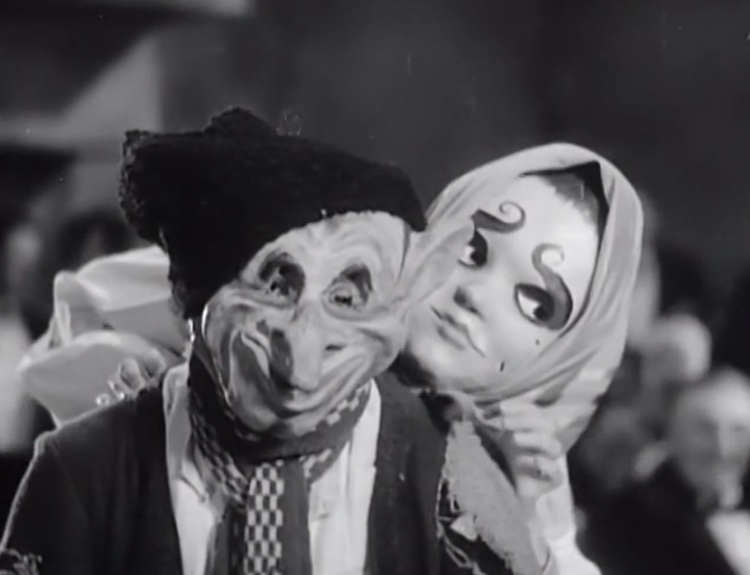
Mac has been invited to the party—to be mocked, I suspect, more than anything—but Spike and his gang show up, too, and we get another long staredown. Just as the tension is dissipating, Scarsi shoots Spike from beneath the table, then surreptitiously passes the gun to an underling. Mac still hauls him in, but his attorney, Sam Meyer (uncredited, even among IMDb's uncrediteds), is waiting at the police station with a writ of habeus corpus. More staredowns. Mac tells him it’s the last murder he’ll get away with in his district—a qualification that cracked me up—while Scarsi calls him “a dumb harp” and tells him he’s through.
Scarsi’s right: A newspaper headline trumpets, CAPTAIN MCQUIGG SENT TO STICKS, i.e., the 28th precinct, which Mac calls “the country” as well as “to hell and gone.” Even from a distance, though, Mac and Scarsi taunt one another, which two Chicago reporters aid and abet. But what finally brings our principles together again is Helen Hayes and the kid brother. Out for a drive, Joe tries to make a move but she’s not having it. So he proposes marriage and gives her the ring Scarsi gave him. She accepts it but won’t accept a kiss, so he tells her to shove off. Problem: Apparently there was a law back then against abandoning women on the road, since a cop sees this, gets involved, Joe panics and drives his car into a wall. There might’ve been a hit-and-run, too. All of this happens in Mac’s precinct. It's his jurisdiction.
Oddly, Mac doesn’t recognize Joe, whose party he was recently at, and Joe’s not talking, even though it’s implied they bat him around. It’s Helen who finally IDs him as Scarsi’s brother, but she’s put in jail, too, without a phone call—the Chicago Way.
Seriously, no group comes off well here. Ward politics is corrupt, the press is sensationalistic, the law excuses the powerful and the police bat people around. When Scarsi’s lawyer shows up with another writ, Mac, our hero, actually tears it up, saying “I’m sick of the law!” Then the cops trip the attorney, claim he’s intoxicated, and throw him in jail. They make Eastwood’s Dirty Harry look like a card-carrying member of the ACLU.
From her jail cell, Helen is romanced by a dewy-eyed cub reporter, Dave Ames (John Darrow), as Mac works to get intel from recalcitrant sources while protecting eyewitnesses such as the arresting officer. Which means the officer is all alone in the precinct when Scarsi saunters in. After a failed bribery attempt, Scarsi shoots him and lams it—but he’s picked up and brought back. Will justice be served? Will DA Welch (Sam De Grasse) let him go? What does the ultimate ward boss, the Old Man, think?
In the end, the Old Man decides he can’t carry Scarsi and the upcoming election, so Scarsi will have to cool his heels for a week or so. He’s not having it and threatens to squawk. So they open the window for him—the DA and the hoodlum-y Sgt. Turck (Wolheim’s brother, Dan), and, yes, he’s killed “trying to escape.”
Now everyone has to file in to view the body and wrap things up. First it’s the reporters.
Reporter 1: But why shoot him?
Reporter 2: So government of the professionals, by the professionals, and for the professionals, shall not perish from the earth.
Then it’s the kids, Helen and Dave Ames. Though he’s been puppy doggish around her, when she tells him she’s not going his way he’s almost like “OK, see ya!” She stays behind, Mac looks wrecked, she says a few snide things. Then it’s just Mac and a fellow cop, who literally asks “What now?” Mac says he’d like some sleep but he has to do X, Y and Z, and by then “It’ll be time to go to Mass.” Fade out.
Yeah. Not a good ending.

Scarsi/Scarface
What did I like about the movie? Some of the lingo. When they capture Scarsi, for example, Mac says to the other cops, “Did you fan him?” I guess that meant “frisk” back then.
Wolheim is great as Scarsi. He’s got a bulldog face and a smashed nose—from an old football injury—and exudes a Capone-like toughness. I also like Lucien Prival as his dandy-ish right-hand man Chick. Was he a Frank Nitti clone? Was Nitti known then? Because I flashed on Billy Drago’s great turn in “The Untouchables.” Prival also has a bit of Wallace Shawn and Pee Wee Herman in him, believe it or not.
John Darrow as the cub reporter isn’t a bad looking kid. He became a mid-level star but then chucked it in the mid-1930s to become a talent agent. There’s a throwaway bio snippet on IMDb that feels like a tale worth telling: “Darrow and his partner Charles Walters were together from 1936 until Darrow’s death in 1980.”
Sadly, the three principles were all dead within a decade:
- Wolheim in 1931, age 50, from stomach cancer
- Meighan in 1936, age 57, from cancer
- Prevost in 1937, age 40, from malnutrition and alcoholism
Maybe the thing I liked most about “The Racket” was finding out who played Scarsi when it hit Broadway: a little up-and-comer named Edward G. Robinson. It was his first gangster role. In fact, he didn’t want to do it because he didn’t know from gangsters. “I had no yardstick by which to create him,” he wrote in the autobiography. But when another play he was in, “The Kibitzer,” folded, he says, “I accepted with considerable misgiving. … Boy, did that play change my life.”
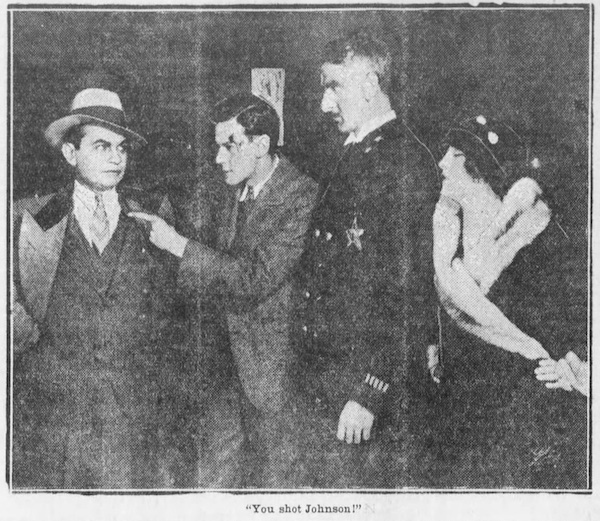
Edward G. Robinson (left) as the original Scarsi, see?
Wednesday March 15, 2023
Movie Review: Chicago (1927)
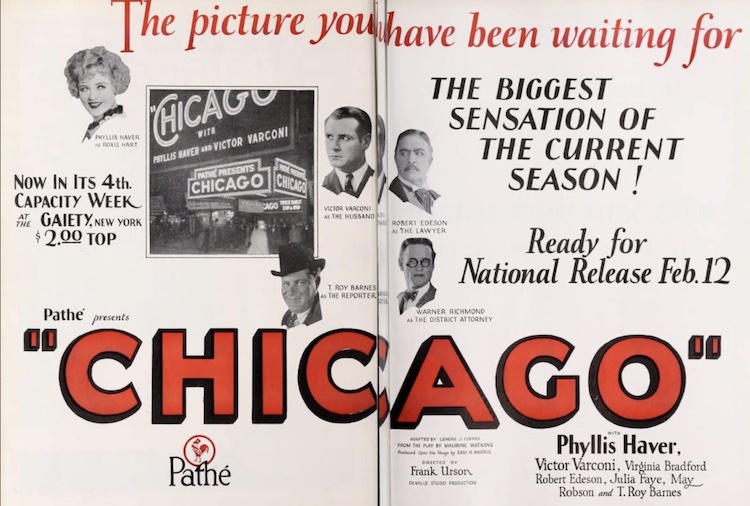
WARNING: SPOILERS
To the obvious question: How does it differ from the musical?
For one, Velma Kelly (Julia Faye) is barely in it—maybe five minutes. She calls Roxie “Peroxide” and the two get into a catfight until the female jailkeeper finally pulls them apart with a good line: “This is a decent jail—you can’t act here the way you do at home!” And that’s pretty much it for Velma. No second act. No “All That Jazz” or “Nowadays.”
Meanwhile, Amos Hart (Victor Varconi), Mr. Cellophane, might have a bigger part than Roxie herself. He’s the film’s sad-eyed moral authority.
But I’d say the biggest difference is this: We never really root for Roxie Hart (Phyllis Haver). She’s just too awful.
Last year’s hat
Why? Why do we root for Roxie in the longrunning Broadway musical, and in the 2002 best picture winner, but not here?
“Chicago” is based on a real incident—the murder of Harry Kalstedt by Beulah Annan in 1924. They were lovers, he was leaving her, so Beulah shot him in the back and then listened to a phonograph record, “Hula Lou,” for several hours before phoning her hapless husband, Albert, and crying burglar/rape. With the help of a high-priced lawyer, paid for by Amos, and a yellow press touting her as the most beautiful murderess in America, she was acquitted. Immediately afterwards, she dumped Amos and married another guy. A few years later, age 28, she died of tuberculosis.
In 1926, Maurine Dallas Watkins, who covered the trial for The Chicago Tribune, turned the story into a play, “Chicago,” and Beulah became Roxie Hart. Much of Watkins' drama played out as in life. She got away with it, she wasn’t sorry, justice didn’t prevail.
This 1927 silent film toes that line except she’s made to pay a little.
It opens on the Harts’ bedroom with its separate beds. I’m curious if this was a Production Code thing—fairly toothless in the 1920s—or a comment on their hapless marriage. Either way, Amos rises, looks lovingly at Roxie, then notices the underwear and high heels strewn on the floor. He gives a loving “Oh, you” look before picking things up. In the kitchen, he sees all the dirty dishes in the sink, shakes his head (it’s less “Oh, you” now), but still rolls up his sleeves. Then he serves Roxie breakfast in bed before going off to work.
Roxie can't stand him.
In real life, the man was a mechanic; here he runs a tobacco shop. One customer, an Al Capone-looking mug named Rodney Casley (the gravel-voiced Eugene Pallette, our future Friar Tuck), says he’s going to give his girl “the air”—i.e., dump her—and hey, he just happens to have the same kind of garter-with-a-bell-attached that Roxie wears. Does Casley know he’s talking to the man he’s cuckolding? I didn’t get that sense. It’s just happenstance. Either way, Casley visits Roxie, they fight over her spendthrift ways, he’s about to leave her, blam blam. And the player piano plays on.
When she calls Amos home, he recognizes his former customer, and, despite her line about a burglar/would-be rapist, begins to suspect her of both infidelity and murder. At the same time, he’s still willing to take the fall. When the law comes, he says he did it. Except the DA is suspicious, gets them in separate rooms, and he tells Roxie her husband pinned the blame on her. She runs into the next room and berates him: “You swore you’d stick!” A second later, she realizes she’s been had. “You couldn’t even trust the man who loves you,” sad-faced Amos tells her.
How scared is Roxie at this point? Not as scared as Renee Zellwegger would be in 2002. Mostly, she's just excited seeing her name in headlines.
Amos: Do you realize that you just killed a man? Are you even sorry?
Roxie: You’re just sore ‘cause I’m getting all the publicity!
Much of the middle of the movie is taken up by Billy Flynn (Robert Edeson): How to get him, how to pay for him, his efforts to keep Roxie in line. He has a good early line when she tries to bullshit him: “I’m not your husband—I’m your lawyer!” But he costs 5,000 smackers. In advance. So Amos: 1) empties his savings; 2) takes a loan on his life insurance; 3) pawns his valuables. That’s $2,500. Flynn refuses it. “Installments?” he says. “You must think you’re buying a Ford!” So Amos turns to crime. He smears grease on his face and robs ... Billy Flynn.
At trial, Flynn dresses up Roxie as an innocent and keeps reminding her to droop. Amos kills it on the stand:
DA: [brandishing negligee] Do you consider this proper attire for a married woman receiving a man visitor?
Amos: [after long pause] I consider as proof that his call was unexpected and unwelcome!
The jury takes four hours to acquit her. She’s free … and famous! Ah, but then the comeuppance. Almost immediately “Two-Gun Rosie” starts shooting up a different courtroom and all the attention goes to her. When Roxie complains, a reporter tells her, “Sister, you’re yesterday’s news and that’s deader than last year’s hat!”
Life sure moved fast 100 years ago.
Karma
Oh right, the subplot.
Two mugs show up looking for the money Amos stole from Flynn and accidentally knock over the potted plant where the rest of it—$2,500—has been stashed. But a nice maid, Katie (Virginia Bradford), to whom Amos had shown kindness, finds it and hides it. When they try to shake down Amos, wondering where his Ingersoll watch is—though what this proves I don’t know—she comes to the rescue, pretending her Ingersoll (which she got with coupons he provided) is his. And the men leave scratching their heads.
So there’s karma in this version. Amos’ good deed with the maid saves him. And Roxie’s wicked ways with everyone doom her. She winds up in the rain, where the headlines about her—the thing she cares most about in the world—are literally washed away into a storm drain.
I’d like to read the original play someday. The mass-media age was just beginning, but fame was already this huge lure, and there were plenty of moths. The play nails that—that fear that you don’t exist unless you exist in the public sphere. You could almost draw a straight line between Roxie and the various influencers and Kardashians today.
Anyway, to the question I asked at the top: Why do we root for Roxie in the musical but not here?
It’s partly when the stories were crafted. In the musical, created in aftermath of Vietnam and Watergate, you’re either on the make (Roxie, etc.) or being made (Amos), and who wouldn’t rather be the former? It was the age of antiheroes. Life’s a great gag, baby, get everything out of it you can. Plus the deck is already stacked against women. Men? They had it coming. I think that’s part of it.
There’s also proximity to the original awful crime. The further away we are from it, the more we can fictionalize it, the less it matters.
But I think the biggest reason may be this: The 1975 musical and 2002 film were written by men (Bob Fosse and Fred Ebb; Bill Condon), while the 1926 play and the 1927 movie were written by women (Watkins; Lenore J. Coffee). And women know how awful women can be. Why, given a chance, they could be almost as bad as men.
Thursday February 23, 2023
Movie Review: It (1927)
WARNING: SPOILERS
I got to see this on the big screen, with my wife Patricia and our friend Becky, surrounded by girls dressed as flappers. It was Silent Movie Monday at the Paramount in Seattle, and, despite the weather (nasty) and the pandemic (ongoing), the place was fairly packed. I pointed out one woman looking great in a rounded 1920s brimless hat. “What do you call those?” I asked Patricia. “Cloche,” she said. “They should bring those back,” I said.
Patricia went with me reluctantly. She’ll watch old movies but tends to draw the line at silents. But she enjoyed “It” and loved Clara Bow.
These days it’s more of a famous phrase than a famous movie—some people even mistakenly call the movie “The It Girl”—but what’s interesting is how the phrase became famous.
Reid first
 In a sense, the true “It” Girl was Elinor Glyn, a matriarchal Brit and racy novelist of the day, who came to Hollywood in 1919, age 55, already famous or infamous for writing about female sexuality, and made deals to write articles for Hearst publications and screenplays for Famous Players-Lasky, which became Paramount.
In a sense, the true “It” Girl was Elinor Glyn, a matriarchal Brit and racy novelist of the day, who came to Hollywood in 1919, age 55, already famous or infamous for writing about female sexuality, and made deals to write articles for Hearst publications and screenplays for Famous Players-Lasky, which became Paramount.
In a 1935 Sunday Sun article on Glyn, they say she first used the term in the early 1920s for Wallace Reid, a silent movie heartthrob.
Glyn: You’re wonderful to look at. Besides, you have IT.
Reid: It? What?
Glyn: That’s the word. Don’t you see that it expresses everything? Either you have IT or you haven’t IT.
Reid: And I have, eh?
She then critiques his hair and shoes, which I love. Even the man who gave birth to IT needs fixing.
I think the term caught on because of its simplicity and vagueness, but that didn’t stop Glynn from constantly trying to define it—or at least hold off the very popular notion that it just meant sex appeal. A losing battle. Here’s IMDb’s current synopsis of the movie:
A salesgirl with plenty of “it” (sex appeal) pursues a handsome playboy.
Quick critique: Yes, she’s a salesgirl, yes, she has plenty of “it,” but “pursues” is iffy and “playboy” is totally off. If anything Cyrus T. Waltham (Antonio Moreno) is a wonk. He owns and runs the department store where Betty Lou (Bow) is a salesgirl. He’s almost always at his desk.
As for what “It” means, the movie keeps giving it a go. We get two intertitles that say about the same thing: IT is a quality which “draws all others with its magnetic force” or “attracts others of the opposite sex.” It should be “unselfconscious,” and “can be a quality of the mind as well as a physical attraction.” Then it’s defined in a Cosmopolitan magazine article by Glyn that another characters reads. And then Glyn herself shows up to hold forth in a grand manner.
Cyrus: Madame Glyn, we've been talking about your latest story. Just what is this “IT”?
Madame Glyn: Self-confidence and indifference as to whether you are pleasing or not—and something in you that gives the impression that you are not all cold. … If you have “IT,” you will win the girl you love.
Got it. Or IT. Or...
As with all love stories, the point is to keep the lovers apart for an extended period. So how do they do it here? The two are never hot for each other at the same time.
- Betty Lou likes Cyrus but he doesn’t notice her.
- Once he does, they go to Coney Island. But when he kisses her, she slaps him and calls him “one of those Minute Men. … The minute you meet a girl you think you can kiss her!”
- Before he can apologize, we get that silent movie trope of welfare ladies trying to take babies away from poor mothers—in this case, Betty Lou’s friend, Molly (Priscilla Bonner). Betty Lou stands up to them, then lies about the baby, saying it’s hers. This gets back to Cyrus, who thinks she’s an unwed mother, and he shunts her to the side.
- When she finds out why she’s shunted to the side, she gets angry. She decides she’s going to get him to propose so she can laugh in his face. Helluva leap. But she makes it happen when she finagles a spot on a weeklong party aboard his yacht.
In the final reel, after a dump in the drink, they both like each other at the same time and we get our happy ending.
Super duper
Watching, I kept remembering Chico Marx flirting with a manicurist in 1931’s “Monkey Business.” “You’ve got IT,” he tells her. When she begins to thank him, he adds, “And you can keep it.”
Bow is great in this. I think the worst scenes are when she tries to convey “It” and gets a little self-conscious; the best scenes are when she’s just feisty. Anyway, it made her a star. Moreno as Cyrus is also good, less self-conscious than Bow but about 20 pounds from peak IT.
William Austin plays “Monty” Montgomery, Cyrus’ friend, who first alerts Cyrus to Glyn’s Cosmo article. He’s comic relief—pursuing Betty Lou but losing out. He also seems either terribly British or terribly gay. There’s a great early scene where he looks himself over in the mirror and declares, “Old fruit, you’ve got IT.” Yes, you do, Old fruit. Fun fact: Austin would wind up as the first cinematic Alfred in the 1943 movie serial “Batman.” In fact, he’s the reason Alfred is thin. Before, the character was fairly portly, but the comic wanted to correspond to the film so they put him on a diet. It’s one of Austin’s last roles. He stopped making movies in 1947, lived until 1975.
Another fun fact: The reporter who breaks the Betty Lou vs. the welfare ladies story is pre-stardom Gary Cooper. He would define IT for the next two decades but isn't even part of the IT discussion here. It’s his last uncredited role.
Sunday January 01, 2023
Movie Review: The Cheat (1915)
It's just like me to start the new year with a review of a not-exactly new movie. I think I've reviewed only four movies older than this one.
WARNING: SPOILERS
I know something about the history of movies, but it was only within the last five or 10 years that I learned about Sessue Hayakawa—and it stunned me. “Wait, there was a Japanese actor who became a matinee idol in Hollywood ... in the 1910s? So we’re not that racist? Or weren’t for a moment? Or something?” It upends so much. It raises so many questions.
“The Cheat” is the movie that did it. That’s nuts in its own way.
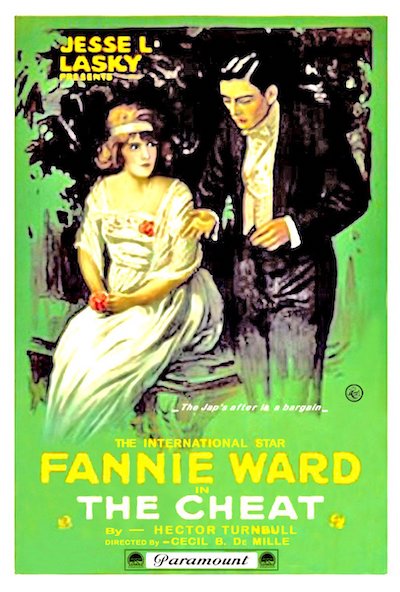 It’s nuts because in the film Hayakawa not only sexually assaults the leading lady and nominal star, Fannie Ward, but literally brands her. He burns his Japanese crest into her upper back as a way of saying, “I own you.”
It’s nuts because in the film Hayakawa not only sexually assaults the leading lady and nominal star, Fannie Ward, but literally brands her. He burns his Japanese crest into her upper back as a way of saying, “I own you.”
It’s also not nuts since Hayakawa was like a modern movie star. He's not only handsome, there’s a stillness to him, and a subtlety to his acting. Everyone else thrashes and emotes in the manner of silent films, while he watches and broods. He seems to know, even at this early stage of film, that less is more.
Cheat what exactly?
The story is not much. Edith Hardy (Ward) is a spoiled society girl who spends more than her stockbroker husband, Richard Hardy (Jack Dean, Ward’s real-life husband), makes. How spoiled is she? Rather than pay the servants, she buys a new dress for the big Red Cross Ball—raising money for Belgians in WWI—for which she’s treasurer. Then she steals that money for stock market speculation. Her husband is working on a big deal, but one of his colleagues tells her, “D&O? Nah, he should buy United Copper,” and she trusts that guy over her husband.
And she loses it all. Now she imagines the scandalous headlines.
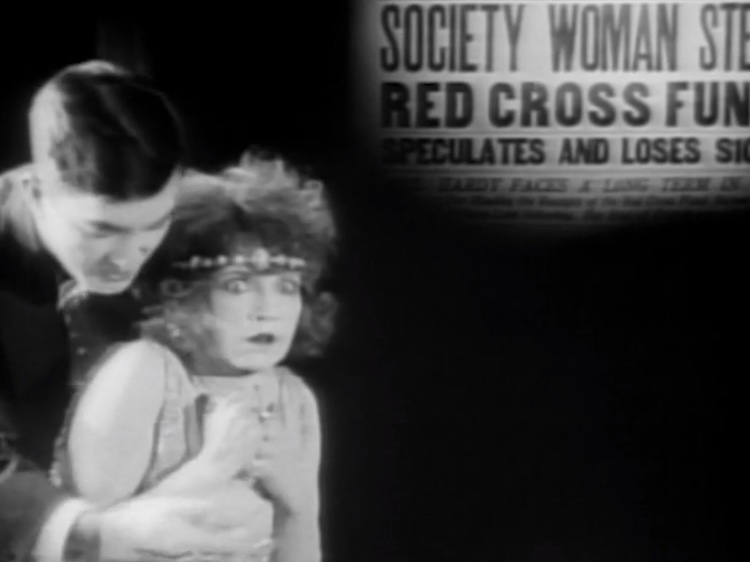
Where’s Hayakawa in all of this? He plays Hishuru Tori, a rich Japanese ivory merchant (or in the 1918 rerelease, Haka Arakau, a Burmese ivory merchant), who has loaned his mansion for the big ball. He actually opens the movie—we see him quietly burning his crest into dolls—but for the first half of the movie he’s a genteel, well-groomed figure in the background, taking Edith here and there. It’s only when he overhears Edith’s plight that his eyes narrow in sinister fashion, and he offers the money.
The version I saw, streaming on Amazon Prime, was the 1918 rerelease—he’s Arakau—and it’s vague about the deal being struck. Before he signs the check, he says “Do you agree?” And we’re all like “Agree to what?” One assumes sex but it’s never stated. Whatever it is, she agrees. “Tomorrow,” he tells her. The next day, though, hubby’s deal comes through, and now they’re rich, rich, so she asks hubby for the $10k. Bridge debt, she claims. He’s remarkably calm about it, merely wagging his finger: Oh, you naughty girl, you. But when she tries to pay back Arakau, he refuses to accept.
I would’ve thought the title referred to Edith stealing Red Cross funds, but this is the chapter called “The Cheat,” so you get the feeling it’s because she tried to get out of whatever she agreed to with Arakau. Later in the film, for example, when she begs Arakau to drop the charges against her husband, he tells her: “You cannot cheat me twice.” So this is obviously the first time. In a way, the movie takes his side. She's the cheat. When he goes in for a kiss, she fights him off. Then he tells his servants to lock the doors behind them. When she says she’ll kill herself, he gives her a knife. She does that silent-movie thing: staring at the object in slow horror.
Was the decision to brand her planned or impulsive? Feels like the latter. Earlier, he was branding a doll, then they struggled, and there she was on the table, like the doll, and the branding iron was hot. She may have recoiled from the knife, but after being branded with a hot iron, she grabs a nearby gun and uses it. She wings him and flees. Police are called. Now, of course, hubby shows up, figures everything out, and rescues his wife by taking the blame.
At the trial, everyone lies on the stand. Arakau fingers Richard Hardy, as does Arakau’s servant, and Hardy’s defense is that he was simply trying to disarm Arakau when the gun went off. Throughout, Edith wrings her hands. When the verdict comes back, “Guilty!,” she thrashes around, her hair comes undone, and she cries out, “I shot Arakau—and this is my defense!” and reveals Arakau’s brand on her upper back. Which is when the jury spectators turn into a lynch mob. But the judge protects Arakau, declares the verdict set aside (is that a thing?), and the Hardys walk through a gauntlet to cheers.
It's a little odd. She still stole Red Cross funds. He still lied on the stand. I don’t know if I’d be cheering them. But endings have to be made.
Rafu Shimpo
But this is how Hayakawa became a huge star, and, as a result, Japan, and Japanese-Americans, celebrated.
Kidding. They didn’t like the rare Japanese star being a sexual predator. From Wiki:
In particular, a Japanese newspaper in Los Angeles, Rafu Shimpo, waged a campaign against the film and heavily criticized Hayakawa’s appearance. … Robert Birchard, author of the book Cecil B. DeMille's Hollywood, surmised that the character's nationality was changed to Burmese because there were “not enough Burmese in the country to raise a credible protest.”
That’s right, DeMille directed this—one of 14 films he directed in 1915 for Jesse Lasky’s Studio, which became, a year later, Famous Players‑Lasky Corporation, which eventually became Paramount Pictures. It’s an early silent film but some shots stand out—like this surprisingly empathetic one after Arakau is shot.
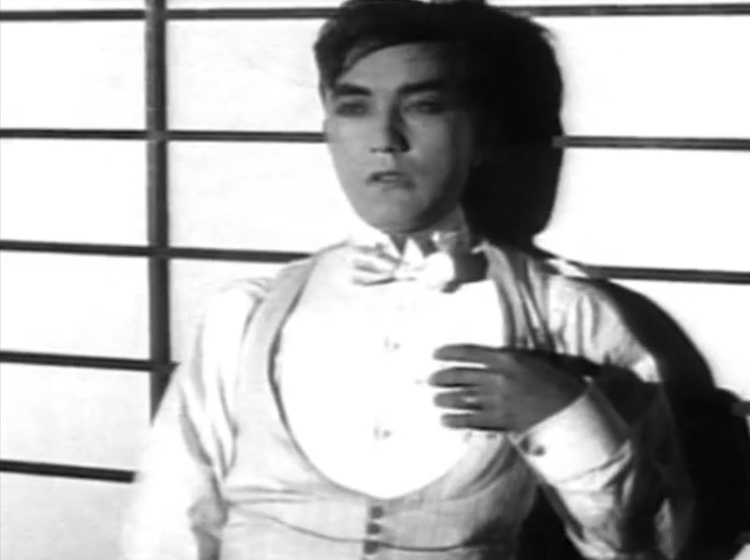
Hayakawa went on to stardom, formed his own production company, and then … I don’t know what happened, to be honest. He suddenly stopped making movies in Hollywood in 1924. He went to New York, Japan, Paris. He made “Daughter of the Dragon” with Anna May Wong in 1932. He didn’t really return to Hollywood until Humphrey Bogart sought him out for a role in “Tokyo Joe” in 1949. The 1950s weren’t bad for him. He starred in a two-part Japanese version of “Les Misérables” in 1950, starred in several other Japanese productions, had a role in “House of Bamboo,” a big Cinemascope epic set in Japan, and was nominated for an Academy Award for his portrayal of Col. Saito in “Bridge on the River Kwai.”
“The Cheat,” meanwhile, kept getting remade with different sexual predators. After Valentino’s rise, for example, Famous Players-Lasky redid it in 1923 with Jack Holt playing a turbanned East-Indian prince lusting after Pola Negri. In 1931, it was the haughty Tallulah Bankhead’s turn to get it at the hands of a white Japanophile. And in 1937 the French got into the act with “Forfaiture.” There, the villain is a Chinese prince named Hu-Long. Who plays him? Sessue Hayakawa.
Saturday November 05, 2022
Movie Review: Beggars of Life (1928)
WARNING: SPOILERS
This is a beautiful little silent film with great performances from the three leads, particularly Wallace Beery as Oklahoma Red, as well as an iconic tomboy-hobo look from Louise Brooks.
It’s based on a 1925 stage play, “Outside Looking In,” by Maxwell Anderson, which was based on the 1924 hobo memoir “Beggars of Life” by Jim Tully. Not sure why Anderson changed the title but I’m glad someone at Paramount changed it back. “Outside Looking In” kind of just floats, doesn’t it? A lot of vowels hanging around without sticking to anything. “Beggars of Life” plants its feet.
I watched it because it’s one of my Cagney-adjacent movies. There are a lot of odd little connections:
- The play “Outside Looking In” was James Cagney’s big theatrical breakthrough. He probably became what he became—or he had a chance to become what he became—because of this play.
- When it moved to Hollywood, they made it without any of its theatrical stars, none of whom had arrived yet. The lead, Charles Bickford, wouldn’t show up until 1929, Cagney until 1930.
- Even so, the director of “Beggars,” William Wellman, is the guy who made a movie star out of Cagney. He convinced Darryl Zanuck to switch roles and give Cagney the lead in 1931's “The Public Enemy.”
- Two years after that, Wellman directed “Wild Boys on the Road,” another hobos-riding-the-rails movie, with the lead played by Frankie Darro, who had played the young Cagney in “Public Enemy” (until the role-switch, basically).
- Apparently Wellman was so impressed with Louise Brooks in “Beggars” that he wanted her for “Public Enemy,” but she bowed out and the role went to Jean Harlow. But in “Wild Boys,” there’s a Brooks-like role—a girl attempting to pass in newsboy cap and jacket—and she’s played by Dorothy Coonan. Who, within a year, became Dorothy Coonan Wellman. She and Wellman remained married until his death in 1875.
Don’t know what to make of all those coincidences.
The rest of the world
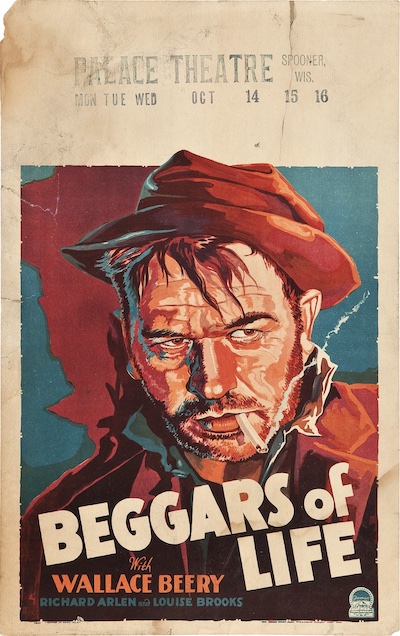 Jim (Richard Arlen, playing the theatrical Cagney role), is a hobo who shows up at a farmhouse, peers through the screen door, and sees a man seated before a meal. He smacks his lips and asks if he can have some. The guy doesn’t respond, because, yeah, he’s dead, and the girl who did it, Nancy (Louise Brooks), is hiding out on the second floor. It was her stepfather, he was sexually abusing her, etc.
Jim (Richard Arlen, playing the theatrical Cagney role), is a hobo who shows up at a farmhouse, peers through the screen door, and sees a man seated before a meal. He smacks his lips and asks if he can have some. The guy doesn’t respond, because, yeah, he’s dead, and the girl who did it, Nancy (Louise Brooks), is hiding out on the second floor. It was her stepfather, he was sexually abusing her, etc.
But no one’s going to believe her so they take to the road, she wearing a newsboy cap and jacket to pass as a boy (right). They should split up—she’s wanted for murder, after all, and the cops somehow know he’s traveling with her—but they both wind up heading west. The first half-hour is a kind of Chaplinish picaresque. They ride rails, share sandwiches, dig a hole in a haystack to sleep. There, he puts his legs over hers and you see fear in her eyes. “To keep you warm,” he says, and she relaxes.
The rest of the world isn’t so nice. One night, they stumble upon a hobo camp but they’re told to get lost—until Oklahoma Red (Beery) shows up with a barrel of liquor over his shoulder. He’s a big, big-hearted man who lets everyone have a drink. Unfortunately, when Nancy bends over for a cup, a guy named Arkansas Snake realizes she’s a girl and it gets creepy fast. “Hey girlie,” he says, and all but descends. Except then someone brings out the WANTED poster and none of them want to be around someone who might draw the cops. Red disagrees, there’s a fight, the cops descend anyway. Then they all hop the next rail to the next town.
Turns out this is a frying pan/fire moment. Up to this point, Oklahoma Red has seemed brassy and fun; now a darker side emerges. To the girl he says, “C’mon, baby, don’t be so exclusive.” To Jim he says, “Why do you think I let her ride with us? My name ain’t Santa Claus!” To everyone he proclaims, “When I ride with a gang, it’s my gang! And if there’s a gal in the gang, she’s my gal!”
He sets up a kangaroo court to convict Jim of the crime of not being a true hobo—basically to get rid of him. Smart, but the girl is smarter. After Jim is sentenced to be thrown from the train, she claims the right to pick her own guardian—and it’s not Jim. It’s Arkansas Snake. So she pits the two biggest men against each other. Red wins that battle but Jim winds up with the gun, and anyway “A bunch of dicks is searching the train!” Here it gets action-y. At one point, Red detaches their car from the rest of train, then it’s out-of-control, then he finally stops it and everyone can hop out.
Our heroes wind up hanging in a shack with a Black man, Black Mose (Blue Washington), who’s carrying a white cripple. We first noticed Mose on the train. He stuck out there because he seemed like a real person, not the usual stereotype of the day. A little background on the actor: Blue Washington is a former Negro Leagues player who went on to have a long if mostly uncredited career in Hollywood. He was in some big movies, including “King Kong” and “Gone with the Wind,” but playing the types of roles you’d expect. Even his credited roles were problematic: Sambo, Hambone, and four different versions of Mose, short for Uncle Mose, which—I didn’t know this—was the male counterpart to the Mammy/Aunt Jemima figure. Washington is also the father of Kenny Washington, who 1) went to UCLA with Jackie Robinson, and is 2) the Jackie Robinson of professional football, breaking the NFL’s color barrier in 1946. During a three-year career as a running back with the Rams, he averaged 6.1 yards a carry.
Here, sadly, “not the usual stereotype of the day” doesn’t last. At one point, Mose is seen comically plucking a chicken. And he’s the last person to realize that his charge, the crippled guy, is dead.
At this point, our heroes are on the lam from both the cops and Oklahoma Red, and it’s the latter who finally catches up with them. He tells the girl that she’s doing nothing but endangering Jim, and she admits this. But when he decks Jim, takes his gun, and demands she go with him, she responds that she’d rather be hung. And here it gets interesting. Red looks both confused and amused. He scratches his jaw. “I’ve heard about it but I’ve never seen it before. … It must be love!” he says via intertitles. And then this additional thought: “I knew there was something wrong with you two.”
God, that’s good, and Beery’s amazing. Add him to the list of actors, like Cagney, who can play bad men that you actually like. For half the film he’s a would-be rapist but he still wins us over. In the end, he risks his life for them. He gives his life for them. His foot slips and they get away. But it’s Oklahoma Red we think about in the end.
Like the clouds
If you’re wondering about the title, it comes from something Jim says in the early going:
Ain’t it funny when you think of the millions of people in warm houses and feather beds, and us just driftin’ around like the clouds? But I guess it’s about even when you boil it down. Even them people in feather beds ain’t satisfied—we’re all beggars of life.
Here’s the oddity: That speech isn’t in the book “Beggars of Life.” The closest we get to the title phrase is when Tully says in the early going, “Everything seemed to pass through my mind—I was not a beggar at the gates of life—I would return to St. Marys a rich man.” So either Benjamin Glazer, who adapted the memoir for the screen, came up with it, or it was in Maxwell Anderson’s play. But if it was in Anderson’s play, that means Anderson invented a justification for the title without using it as the title. Plus he gets no screen credit here. Paramount claims it was adapting Tully, not Tully/Anderson.
To which … yeah, I doubt it. The memoir is loose and episodic. There’s a kangaroo court but it’s in a prison not a railroad car. There’s an Oklahoma Red but he doesn’t show up until Chapter 21 and only sticks around for three of the book’s 31 chapters. There’s a girl who kills her molesting father but Tully doesn’t meet her on the road; he remembers her from his hometown, St. Marys, where he met her in the red light district. Yet all these elements magically came together in the movie the same way they came together in Anderson’s play?
From what I can glean from reviews back then, the play began in the hobo camp, and we get the stories of Jim/Little Red and Nancy by and by. Apparently Jim met Nancy on the road, too, post-murder—which makes way more sense. It makes you realize what a fantastic coincidence the movie opens with: Jim just happening upon a house mere minutes after a murder has been committed. But I’d say the movie’s most dated scene is near the end when Nancy dresses up in girlish attire—bonnet and dress—for Jim. He, and the film, think she’s lovely, but to modern eyes she looks ridiculous: like a dress-up doll. I actually laughed out loud. Her hobo-tomboy outfit is much more contemporary. Not to mention cool.
But these are minor matters. Wellman filmed this thing beautifully and touchingly. I’d love to see it on a big screen someday.
SLIDESHOW
Saturday October 22, 2022
Movie Review: Outside the Law (1920)

WARNING: SPOILERS
Tod Browning’s “Outside the Law” starts convoluted, becomes interminable, then does what movies do best: wraps up with gunfire.
It both honors Chinese culture (Confucianism) and doesn’t (yellowface). It’s got an early dual role for Lon Chaney and one of the first screen appearances by Anna May Wong, but it’s mostly a vehicle for a little-remembered actress, Priscilla Dean, who was a star during silents but didn’t handle the jump to talkies well—though I can’t find out why. Did she sound like a truck driver? Did she lisp? Maybe she aged out? She’s 24 here but looks about 40.
Good with the glower
It opens with a book, “The Sayings of Confucius,” and this plot device: a Chinese wise man in San Francisco’s Chinatown neighborhood, Chang Low (E. Alyn Warren), is helping reform notorious gangster “Silent” Madden (Ralph Lewis) and his daughter, Molly, aka “Silky Moll” (Dean), by using Confucianism. Right, that old gag.
A rival gangster, “Black Mike” Sylva, aka “Blackie” (Chaney), doesn’t see this as the opportunity it is—to take over his territory without a fight. Instead, like an idiot, he decides to set up Madden in convoluted fashion: He starts a gun battle, kills a cop, plants the offending weapon, and has his stooge, Humpy (John George, a successful little-person actor of the era), point it out to the cops and say he saw Madden hide it there. An intertitle lets us know the results:
Lack of evidence saved Madden a life term — Yet, “because he was there,” he must serve eight months — and the prophecy of “Black Mike” came true.
Wait, the only evidence against him is Humpy’s say-so? Who was the guy that told Madden to head toward the shooting? And is part of Black Mike’s gang? Silent Madden needed a better lawyer.
Anyway, now Black Mike can take over Madden’s territory. Done and done.
Nope, not yet. Now Blackie plots a jewel heist with Molly and “Dapper” Bill Ballard (Wheeler Oakman), but the real plot is to betray Molly—to have the cops catch her with the jewels. Why? Apparently Black Mike just doesn’t like this family. He's the anti-Corleone: It’s not business, it's personal.
Except Dapper Bill betrays Blackie. He lets Molly in on the plot, and together they steal the jewels from the safe in the mansion and make their getaway together. Why does Dapper Bill—who’s not that dapper—do this? He loves her. There’s just not much onscreen heat. We hardly see them embrace, and Molly glowers a lot. It’s like they skipped the fun stuff and went right to “married for 20 years.”
Molly uses that glower to good effect during the interminable middle of the movie, when the two are hiding out in an apartment on Knob [sic] Hill. She’s trying to play it cool but he’s champing at the bit. He wants out.
But guess what he does to amuse himself? No, not that. He helps the boy across the hallway (Stanley Goethals) build a kite—as mobstsers are wont to do. He really really really loves this kid, who has a Dutch boy haircut and an overly cute way of talking via intertitles: “Oo don’t love me like him do, does oo?” (No, kid, she doesn’t.) The kid so warms his heart that Dapper Bill wants to become a dad, too. This leads to more scowls from Molly, of course, until finally Bill can’t take it anymore. He goes for a walk around Nob Hill, damnit.
Two things happen as a result.
One, he’s spotted by Humpy, who, yes, seems to be everywhere.
And two, the fucking kid comes over again, this time with puppies, and hangs around despite Molly’s scowl. At one point, he finds Molly’s gun between the chair cushions and points it at her. She grabs it and yells and he cries. (At this point I’m like: Where are this kid’s parents?) Then he demands to be hugged. Then he hugs Molly. And that’s the thing that finally turns her frown upside-down. She melts. And when Bill returns from his walk, she says, yes, she’s ready to have kids, too. Done and done.
Except, whoops, that's right, they're jewel thieves. What to do with the jewels? She wants to keep them as their nest egg, he wants to give them back so they don’t spend their lives looking over their shoulders. He also seems to think if they just give them back they won’t be charged. So obviously not a law school grad.
What finally convinces the scowling Molly to see it Bill’s way? Sitting in her chair, brooding, she notices the shadow of a cross along the floor of their living room. Turns out it’s what’s left of the tattered kite, which is stuck to something outside their building. But that’s what does it. The shadow of the cross. Done and done.
Actually, we have a half hour left of this 75-minute movie. I didn’t lie when I said it was interminable.
Humpy spotted Bill, remember, so when the two go to leave the apartment, with a blast of quite-effective music, they find Black Mike hanging in the hallway.
Bill tries the triple-cross, saying he was just waiting to find out where Molly hid the jewels so he could bring them back to Black Mike. At this point it gets a little confusing, partly because there's missing and damaged footage. Suffice to say, Bill and Molly get away with the jewels and return to Chang Low’s place. And guess who’s there? “Silent” Madden, who’s out after eight months with bitterness in his heart. He wants the jewels as a kind of payment, Chang Low says no, Blackie and his men show up outside, and we get a big gun battle.
In the end, Blackie and most of his men die, and Chang Low convinces the cops not to prosecute. The chief: “You’ve won, Chang Low — you’ve got the right dope. Keep up the good work.”
So obviously not a law school grad.
Cagney connects
A few things of interest to gangster movie fans—or maybe just James Cagney movie fans. Humpy seems a forerunner to Snitz Edwards’ Miller from “The Public Enemy”: height-challenged, loyal to the gangster we don’t like, third-reel snitch of the protagonists’ hideout.
Then there’s the “Public Enemy” publicity photos of Cagney that look a lot like Chaney here.
And finally, this intertitle card from Blackie:
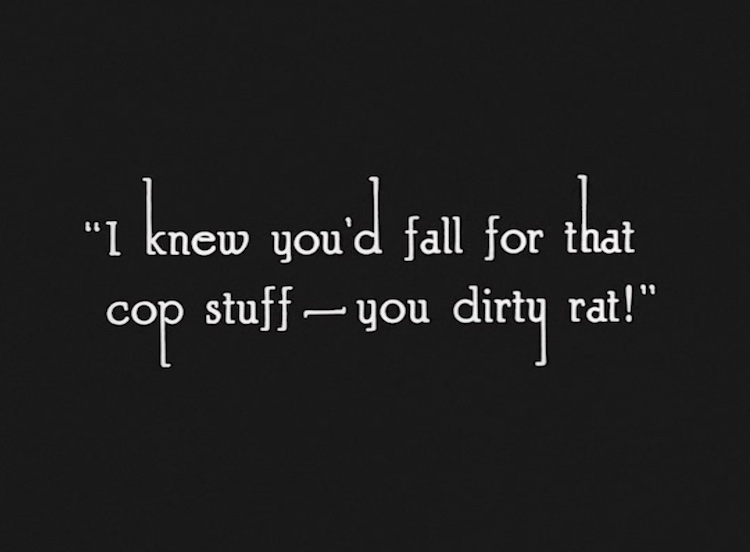
Chaney is good here—I don’t know if I’ve ever seen Chaney and not been impressed—but it’s an unnecessarily dual role. Besides Black Mike, he plays Ah Wing, Chang Low’s servant. Still trying to sort out the yellowface thing. It seemed to lean toward leading men and heroic portrayals. If they were comic relief, sure, give it to the real Chinese guy. It also feels like Asian women were more often cast as Asian women. Anna May Wong’s career was stunted, but she actually had one.
Priscilla Dean, meanwhile, made her last movie in 1932, “Klondike,” fifth-billed to Thelma Todd and Lyle Talbot, then she got out of Dodge. She died in 1987 in Leonia, New Jersey. I know people who lived there then. They never heard of her.
SLIDESHOW
Wednesday October 05, 2022
Movie Review: The Tong Man (1919)
WARNING: SPOILERS
They never say why Louie Toy doesn’t just pay off the Bo Sing Tong, do they? He’s an opium smuggler, they’re the Chinese mafia, why not just pay the tribute? Doesn’t he know what will happen? It doesn’t seem like a power move, either. He’s not machinating. And he doesn’t cry poverty. So what is he doing? I guess furthering the plot? I guess creating the plot?
“The Tong Man” is basically Romeo and Juliet in Chinatown if Romeo were a hatchet man and Montague lusted after Juliet. It’s a 50-minute feature that mixes gangster elements with old-timey melodrama. Tropes I’ve only seen in cartoons or satires are displayed here straight-faced. My favorite: When the leader of the Bo Sing Tong, Ming Tai (Marc B. Robbins), first sees Sen Chee (Helen Jerome Eddy), the beautiful daughter of Louie Toy, he smiles villainously and literally rubs his hands together.
 There’s yellowface, of course, but with a difference. The romantic lead, Luk Chan, is played by silent film icon Sessue Hayakawa, and the film is made by his production company, Haworth Pictures. So among the leads, the two Anglo actors I mentioned above are the only examples of true yellowface. For the other main characters: Toyo Fujita plays Louie Toy, and future director Yutaka Abe is Lucero—“a Lascar sailor” and helpmate to the romantic couple. Plus Hayakawa.
There’s yellowface, of course, but with a difference. The romantic lead, Luk Chan, is played by silent film icon Sessue Hayakawa, and the film is made by his production company, Haworth Pictures. So among the leads, the two Anglo actors I mentioned above are the only examples of true yellowface. For the other main characters: Toyo Fujita plays Louie Toy, and future director Yutaka Abe is Lucero—“a Lascar sailor” and helpmate to the romantic couple. Plus Hayakawa.
So is this a kind of yellowface? They’re all Japanese actors playing Chinese characters. I know it’s 1919, but, given Hayakawa, etc., you’d think a story about the Chinese in Chinatown would include some Chinese actors.
Slow boat
The plot: The Tong gang decides to kill Louie Toy for the aforementioned nonpayment, the joss is consulted, lots are chosen, and Luk Chan, a “highbinder” and the most feared hatchet-man in the Tong gang, gets the assignment. Unfortunately, he’s in love with Toy’s daughter. So even though he has ample opportunity, and even though he himself will be killed if he doesn’t go through with it, he can’t kill Toy.
At this point, I assumed we would get machinations from Ming Tai. I assumed he would go to Louie Toy and say, “Hey, Chan is going to kill you, watch out,” so Toy would kill Chan instead and go to prison for the crime, leaving the girl unguarded. Instead, Ming Tai is fairly upfront. He tells Toy that the Tong will let him live but he has to give up his daughter. Toy looks shocked (the actor often looks shocked) but agrees, then locks the distraught girl in her room. There, she decides to use the poison incense girls apparently kept lying around back then. Lucero overhears, gets Luk, and the two men save her; then they escape (from both the Tong and the cops) over the rooftops of Chinatown.
The next day, Louie Toy says he’s had a change of heart about giving his daughter away. Ming Tai isn’t exactly understanding: He kills Toy and blames it on Chan. Then he and his men kidnap the girl—bag over the head and everything. Back in his lair, he fans her awake so he can sexually assault her. Watching from above, Chan crashes through the skylight (a nice stunt), battles the Tong gang, and delivers a hatchet to the face of one assassin (a nice, early special-effect). Then they escape.
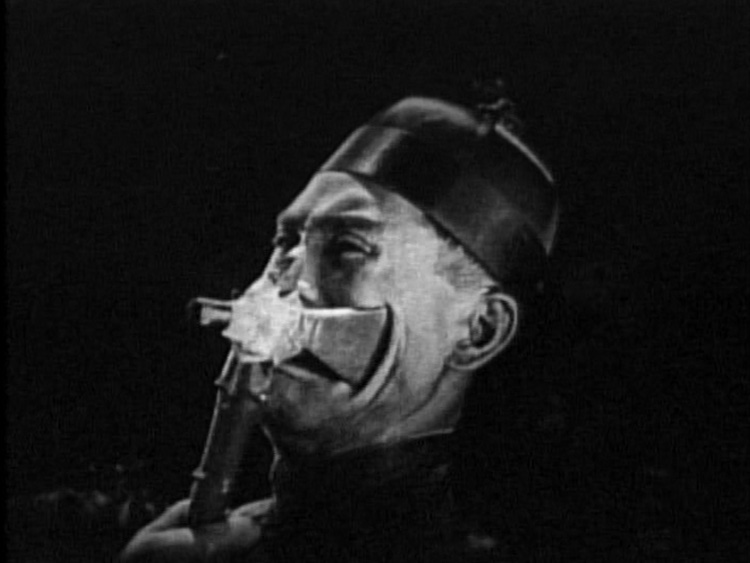
The couple winds up hiding in the (metaphoric and literal) belly of the beast. In the Bo Sing Tong headquarters, which—I think—is part of Ming Tai’s gambling and ‘hop’ joint, there’s one of those paper-mache dragons you see at Chinese festivals. That's where they go. But when Ming Tai shows up to pray to the joss, Chan thinks it’s Lucero returning with news and reveals himself. Ming Tai is taking aim when he himself is shot in the back by Lucero. (Seriously, Lucero does almost everything in this thing.)
After that, they get on a slow boat to China—with Lucero. We see the lovers in silhouette against the moon. They embrace. The End.
Tong in Hong Kong?
I know, but I like all the historical tidbits. Silent films were still in that phase, for example, when they would include the stars’ names on the intertitles.
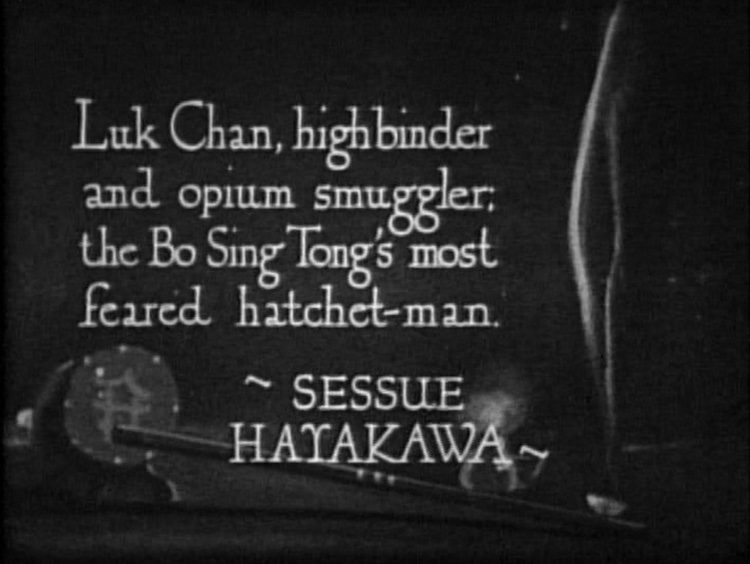
Marc Robbins, who plays Ming Tai, gets this treatment, too, though he hardly seems like a star. But at least his yellowface make-up is better than Helen Jerome Eddy’s. She hardly looks Chinese. I kept thinking, I don’t know, dowdier sister of Olivia de Havilland.
The whole “Tong” thing is fascinating. It was written up a lot during the period—in newspapers and in fiction. Ditto hatchet men. Edgar G. Robinson would play one 13 years later. Did Hollywood ever attempt a more serious film on this topic—the Tong Wars from the turn of the century? Has Hong Kong ever tried it?
The director is William Worthington, an actor who took up directing (1915-25) before returning to acting for the last 15 years of his life. The movie is based on a 1912 novel, “The Dragon’s Daughter,” by Clyde Westover, which is still available on Kindle. A 1922 article describes Westover as a “short story writer, author of odes, dramatiser, script builder, playwright, jingler, novelizer, official greeter and secretary of the [San Francisco Press] Club." A survivor, in other words.
Wednesday September 14, 2022
Movie Review: Alibi (1929)
WARNING: SPOILERS
The crime at the center of the film—for which the titular alibi becomes necessary—involves a warehouse fur heist gone wrong, leading to the death of a passing cop.
Yes, it’s the same crime Tom Powers and company would commit in “The Public Enemy” two years later (and parodied two years after that in “Little Giant”). So did Bright and Glasmon lift the idea from screenwriters Roland West and C. Gardner Sullivan, who were adapting the 1927 stage play “Nightstick”? Or were warehouse fur robberies a big deal in the 1920s?
 “Alibi” is one of the first gangster films of the sound era, so most of the actors speak in that odd, slow, dreamlike cadence of early talkies rather than the snappy patter of a Cagney or Robinson. But we get some great shots from director Roland West: the shadow of the detective outside the door while Soft Malone (Elmer Ballard) is being grilled; Billy Morgan (Regis Toomey in his film debut) drunkenly reaching for booze; the rooftop escape of Chick Williams (Chester Morris, nominated for an Oscar).
“Alibi” is one of the first gangster films of the sound era, so most of the actors speak in that odd, slow, dreamlike cadence of early talkies rather than the snappy patter of a Cagney or Robinson. But we get some great shots from director Roland West: the shadow of the detective outside the door while Soft Malone (Elmer Ballard) is being grilled; Billy Morgan (Regis Toomey in his film debut) drunkenly reaching for booze; the rooftop escape of Chick Williams (Chester Morris, nominated for an Oscar).
Most unexpected? A pretty good mid-movie reveal.
Cops just don’t understand
It begins the way “The Big House” (also starring Morris) began a year later: with the robotic clomping of the feet of marching prisoners. One is singled out. He’s shown a piece of paper with his prison ID on it, “No. 1065,” and it morphs into his name, “Chick Williams.” When we next see him, he’s wearing a suit, rather than his prison grays, and shaking the guard’s hand on the way out. Nice bit.
Then we’re a nightclub run by Buck Bachman (Harry Stubbs), with the dancing girls and singers of the era. Chick is there with his girl, Joan (Eleanor Griffith), at a table with Buck and his wise-cracking moll Daisy (Mae Busch), and they’re talking about the bum rap Chick got. A drunk stumbles over. It’s Billy Morgan, boy stockbroker. He’s got an eye for Joan and engages in some shenanigans to get her address. Buck calls him harmless. We wonder.
For the first half, it feels like a wronged-man movie. Chick is courting Joan, the daughter of Sgt. Paul Manning (Purnell Pratt), but the old man hates Chick, whom he calls a jailbird, and wants Joan to marry Det. Tommy Glennon (Pat O’Malley). But Joan doesn't want to marry a cop. Some of her thoughts feel on the matter feel surprisingly contemporary:
Tommy: Now what’s the matter with policemen?
Joan: They’re man hunters. They’re cruel and merciless—always hounding some poor devil and sending him to jail. They think themselves great heroes.
Tommy: Well, we’ve got to uphold the law.
Joan: Law! Is third-degreeing—bull-dogging people into confessing crimes they didn’t commit—is that law?
Tommy: No, but... Oh, I don’t understand.
Joan: Of course you don’t. You’re a policeman.
Much of the film bears her out, too. When Dad finds out Chick and Joan got married, he literally locks up his daughter like she’s in a fairy tale. Then he tries to railroad Chick into jail again by pinning the fur heist/cop killing on him with zero evidence. When his own daughter provides the alibi—that they were at the National Theater that night—Dad sends Tommy to see if it was theoretically possible for Chick to have committed the crime. And it was! The show has an intermission between 9:55 and 10:05, and the cop was killed at 10 PM—just five minute away.
Which is when they start sweating witnesses, specifically Soft Malone, who was seen driving away from the scene of the crime. How do they sweat him? They threaten to kill him. Here’s Tommy:
You ever know what happened to Gimpy Jackson after he shot a cop? He just disappeared.
A few minutes later, he gets more specific:
How’d you like to be buried next to Gimpy Jackson, Soft?
Holy crap. At this point, I’m thinking: Well, the movie was independently produced, by West, and distributed by United Artists, and it was pre-code, so cops didn’t have to be heroes. Even so, it felt revelatory: The cops are the bad guys!
All that strongarming works, too: Soft gives up a name, and it’s Chick’s. So Dad got what he wanted. And now they’re going after him.
Which is when we get our second reveal.
The first reveal is that Billy Morgan, the drunk broker who finagles Joan’s address, is in fact an undercover cop, Danny McGann. The second reveal is that our poor put-upon hero is in fact a cold-blooded cop killer. Dad was right: Chick actually runs the gang; Buck is a flunky. When Chick discovers that Soft Malone has been pinched, he looks for a respectable citizen who might “verify” that Chick phoned him at 10 PM from the National Theater on the night of the killing. Guess who he chooses? Billy Morgan, boy broker.
All of that is kind of fun. Everything is the opposite of what it seemed in the first half:
- Put-upon hero is ruthless killer
- Drunk lech is hero cop
- Soft-voiced cop is tough hero
- Outspoken woman is absolute idiot
Yes, that means the movie's hero, Tommy, also threatened to kill a witness in cold blood. But I guess you can’t have everything.
What cowards these criminals be
My favorite character is Daisy. She’s a smart cookie who’s stuck with Buck, a dull lump, and she gets off some of the best lines. After everything goes awry, he tells her to pack a suitcase, she balks, and he pushes her head-first into a door. (Makes a grapefruit-to-the-face seem loving.) Shortly thereafter, Chick arrives, sees Joan on the phone (unknowingly alerting the cops to their whereabouts), and starts yelling at Buck.
Chick: What do you mean letting her use that phone? I oughta break your neck.
Daisy: Oh please. Don’t talk about it. Do it.
As revolutionary as the movie seems early on, with Joan’s diatribe against coppers, it winds up at the other, more predictable extreme, with Tommy not only catching Chick but taunting him into proving what a coward he is. That said, Chick’s death is handled well. He escapes to the rooftop, jumps to another building, barely makes it, then loses his balance and falls silently to his death. I flashed on Roth’s death in Norman Mailer’s “The Naked and the Dead.”
It’s not a bad little movie, totally undeserving of its current 5.7 IMDb rating. Don’t think Morris deserved his Oscar nom, but I guess the mid-movie switcheroo impressed early Academy voters. Set design is crazy fun: those art-deco doors of early talkies, along with almost Dali-esque wallpaper.
Director Roland West is probably best known today for being a suspect in the 1935 death of Thelma Todd, his one-time lover and business partner (of Thelma Todd’s Sidewalk Café), whose body was found in West’s garage in a still-running Packard convertible. He directed several good Lon Chaney movies in the silent era, and obviously made the transition to talkies well enough, so I’m not sure what happened to him. His last film, as director or producer, was “Corsair” in 1931, starring Chester Morris and Thelma Todd. He also has several ur-superhero connections. His 1926 silent film, “The Bat,” was part of the inspiration for Batman, while West later married Lola Lane, one of the Lane sisters (“Four Daughters,” “Four Wives”), whose name, yes, helped inspire Jerry Siegel’s Daily Planet reporter.
West died in 1952, age 65. In his obit, “Alibi” is called “one of the greatest hits in motion picture history.” It wasn't, then or now, but it's better than 5.7.
SLIDESHOW
Tuesday April 06, 2021
Movie Review: Underworld (1927)

Brook looking Jean Gabin-ish, Semon in the staircase, Bancroft and Brent. They're about to see that the city is theirs.
WARNING: SPOILERS
First, the firsts.
“Underworld” is one of the first films directed by Josef von Sternberg as well as one of the first great gangster pictures. It’s the first credit for legendary screenwriter Ben Hecht as well as the first film to win an Academy Award for best original story. Both films vying for the award that year—this and “The Last Command”—were directed by Sternberg, who received zero nominations, and got bupkis from the Academy for his career.
All of which gets into the tricky Hollywood problem of credit. In his book, “Who the Devil Made It,” Peter Bogdanovich recounts a university screening of “Underworld” and “The Last Command,” with Sternberg present, and the man wasn’t exactly quiet on the topic:
During the credits of both movies he called out that several people listed on the screen—especially the writers—had nothing whatever to do with the film; their names were there only because the studio paid them regularly and had to put their names somewhere.
Let’s get into the gangster stuff.
Bank notes
“Underworld” feels like the movie that subsequent gangster movies either riffed off of or ripped off. It’s about a boisterous, childlike gangster, “Bull” Weed (George Bancroft), who, early on, gazes at an advertisement from A.B.C. Investment Co. that feels like a secret message to him: “The City is Yours.” Five years later, Howard Hughes’ “Scarface,” also written by Hecht, features a boisterous, childlike gangster, Tony Camonte (Paul Muni), who, early on, gazes at an advertisement from Cook's Tours that feels like a secret message to him: “The World Is Yours.”
Near the end of the film, on death row, Bull commits as grand a sacrifice as any man can make, giving up what’s most important to him to benefit others. Eleven years later, in “Angels with Dirty Faces,” Rocky Sullivan (James Cagney), on death row, commits as grand a sacrifice as any man can make, giving up what’s most important to him to benefit others. (“Angels” also features Bancroft in a smaller role.)
In the real world, “Underworld” prefigured the difficulties gangster flicks would run into with censors. The British Board of Film Censors rejected the movie twice until extensive cuts were made to limit the lead character’s likeability and the film was retitled to something more properly scolding: “Paying the Penalty.” Overall, “Underworld” prefigures all gangster movies by portraying gangsterism as a world unto itself, where the real trouble is less the law than rival gangsters.
It opens with a literal (albeit silent) bang. As a drunk is weaving along in the night, an explosion goes off at a nearby bank and a second later “Bull” Weed emerges with the dough. Since the drunk recognizes him, Weed knocks him out and takes him along. I like the way, back at the hideout, almost in one swift movement, Bancroft is able to toss the man onto a bed while kicking the door closed with his foot. That’s some big-man grace. Even better is this exchange, after Bull realizes the man is an alcoholic and knocks the booze out of his hands:
Bull: That’s what makes bums and squealers!
Man [standing shakily but with dignity]: I may be a bum but I am no squealer. I might say, sir, that I am a Rolls Royce for silence.
So Bull not only gets him a job at the Dreamland Café but a nickname: Rolls Royce. He’s played by Clive Brook, who’s got a bit of a Jean Gabin thing going, particularly when he’s down and out, with a cig clenched in his mouth.
The oddity of Bull is he has no crew: just a moll, Feathers (Evelyn Brent), and an associate, Slippy Lewis (silent comedian Larry Semon), who’s more comic relief than tough guy. At Dreamland, he spins his hat in the air like a frisbee and it returns to him like a boomerang; then he puts 5¢ into a kind of vending machine that dispenses flower water for his handkerchief. (Did anyone else know these things existed?) Meanwhile, across the café, rival tough guy “Buck” Mulligan, neither stately nor plump, has about five guys hanging on his every word. Unlike Bull, he’s a nasty, cramped man who sees slights everywhere. Feathers doesn’t acknowledge him so he tries to impress her by humiliating Rolls Royce. He tosses a $10 bill into a filthy spittoon and says go fetch. When Rolls retains his dignity, Buck knocks him down. When Bull intervenes, their rivalry begins.
That basically sets up the rest of our movie. As Bull and Buck try to outmaneuver each other, a cleaned-up Rolls and Feathers fall for each other; but neither wants to betray Bull, the man who rescued them both. The centerpiece of the film is an annual gangsters ball, “The underworld’s armistice—when, until dawn, rival gangsters bury the hatchet and park the machine-gun.“ There’s a “moll of the ball” contest, where votes are bought, proudly and in the open, and which Feathers wins. Rolls is initially reluctant to go, feeling too attracted to Feathers, but Bull tells him, with his usual bonhomie, “Everybody with a police record will be there!” But it’s at the ball that he first gets an inkling of their attraction for one another, and he turns angry and jealous; then he gets drunk and passes out, giving Buck, amid the mounds of leftover ticker-tape, the opportunity to attack Feathers in a back room. I assumed it would be up to Rolls to save the day but I assumed wrong. Instead, Buck’s moll rouses Bull, who not only saves Feathers but follows Buck back to his flower shop and guns him down in front of the “Rest in Peace” floral arrangement Buck was saving for Bull. Nice touch.
I also assumed Rolls, who had once been a lawyer, would now come to Bull’s rescue in the courtroom. Wrong again. Instead, not only is Bull found guilty of killing Buck but he’s sentenced to die for it. I’m like “Really? A gangster tried to rape his girl and he killed him in self-defense—and no one could lessen the sentence?” It’s moments like that when you get what the British censors objected to. Justice system doesn't look too justice-y.
Like Cagney in “Angels,” Bull is taking his death sentence with a “Them’s the breaks” shrug until everyone starts talking up what an item Feathers and Rolls have become. They’re not, or at least they take every step forward reluctantly and suffused with guilt. They also try to spring Bull. The plot is convoluted and fails quickly, but Bull assumes it was never put into action, and he becomes so enraged at the betrayal that he breaks free. At his hideout, he confronts Feathers, who denies all; then he fends off the police, who—in another touch the British censors probably didn’t like—turn the apartment building into a shooting gallery. Alerted late, Rolls risks his life to get through the police line to give Bull the keys to a secret passageway that could lead to safety. (Wait, secret passage? In an apartment building? This would only work if they were in the basement, which, based on where the police guns are aimed, they’re not.) Seeing the sacrifice Rolls made for him, Bull makes one for them. He lets them use the secret passageway and then gives himself up. A cop mentions he went through a lot for just another hour. “There was something I had to find out,” Bull responds. “And that hour was worth more to me than my whole life.”
Grace notes
Silent movies can be a slog, and there were moments when this one dragged—the mopiness of the couple, gazing into the middle distance—but mostly I was mesmerized. It’s beautifully framed and photographed, and makes great use of shadows. Sternberg made his name with the early arthouse film “The Salvation Hunters,” and the artistry is there in this commercial project. There’s a great sequence at the hideout after Bull has escaped prison. Alone, he hears someone in the hall outside, and Sternberg shows us the shadow of an official-looking man skulking along. Bull listens at the door, peers through the keyhole, then throws it open to see ... nobody. Just a bottle of fresh milk left by the milkman, along with a small, interested kitten. He brings both inside while he sits in a chair and thinks. Becoming aware of the kitten again, he absent-mindedly sticks his thick finger into the bottle and lets the kitten lick off the milk.
There are so many grace notes like that, nice, unnecessary touches, like Feathers’ feather slowly floating down into the Dreamland Café and to the attention of Rolls Royce. (Sternberg to Bogdanovich: “I even had feathers sewn into her underwear.”) I also love the reminders—like with the milkman—of the disappeared life we used to live. Did we really use so much ticker-tape? I still can’t get over that flower-water vending machine. Was that really a thing? When did it come in and when did it go out?
Like so much that’s innovative and artistic, the suits didn’t know what to make of “Underworld,” and Paramount was initially reluctant to release it, then just put it in one theater in New York, where they assumed it would get no notice and drop from sight. Instead, it became a huge hit, helped make the careers of everyone involved, and helped make the gangster genre.
Saturday January 09, 2021
Movie Review: The Black Bird (1926)
WARNING: SPOILERS
Lon Chaney was known as “The Man of a Thousand Faces” and this film is a kind of primer on that. He has a dual role and we get to watch his character physically transform from an able-bodied man to one crippled by childhood disease. It's stunning. Ironically, the one thing that doesn’t change much is his face. His saintly character never looks saintly enough. He looks like the same bastard both ways.
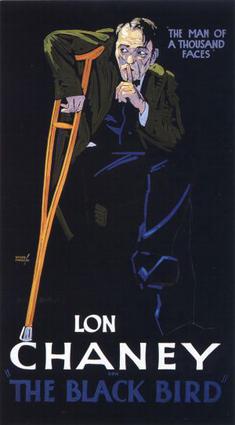 When I began the film it seemed an earlier version of “San Francisco”—crook on one side, saint on the other, music hall in between—but instead of boyhood friends, they’re brothers, twins, who live in the Limehouse District in the East End of London at an unspecified time. It feels 19th century. The Bishop (Chaney) runs a mission and is beloved by all. He’s also crippled, with a gnarled right hand, an arm held at a 90-degree angle, and a useless, dangling leg, who gets around by means of crutches. His brother, Dan Tate, or the Black Bird (also Chaney), is a despised thief.
When I began the film it seemed an earlier version of “San Francisco”—crook on one side, saint on the other, music hall in between—but instead of boyhood friends, they’re brothers, twins, who live in the Limehouse District in the East End of London at an unspecified time. It feels 19th century. The Bishop (Chaney) runs a mission and is beloved by all. He’s also crippled, with a gnarled right hand, an arm held at a 90-degree angle, and a useless, dangling leg, who gets around by means of crutches. His brother, Dan Tate, or the Black Bird (also Chaney), is a despised thief.
As the movie opens the cops have come calling about a recent crime, but the Bishop says no, Dan was there all night, and goes upstairs to get him. That’s when we discover the Bishop is the Black Bird. Dan simply contorts his body into the Bishop’s shape.
Then the movie forgets about the Bishop for half its length.
Da Bishop
Instead, we follow Dan, usually at a rundown music hall, with its cheap liquor and crappy acts, along with groundlings drinking the former and hooting the latter. The one act everyone seems to love is a bizarro puppet show put on by Fifi Lorraine (Renée Adorée, née Jeanne de la Fontein). It’s a regular puppet show but her actual (large) head is on one of the puppets, while one puppet can elongate its neck to extreme degrees.
This is one of the moments that remind us that Tod Browning, famed for the 1932 movie “Freaks,” directed “The Black Bird.” Another is the movie’s opening: a series of close-ups of the tough, grotesque faces that populate the Limehouse District.
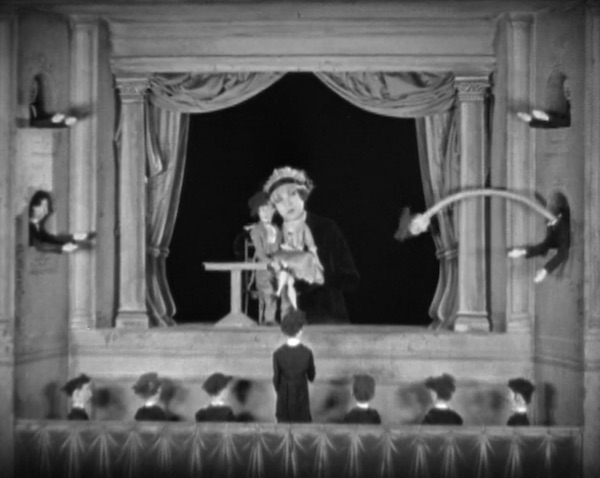
A Browning moment.
Of course Dan falls for Fifi. So does another thief, “West End Bertie” (Owen Moore, Mary Pickford’s first husband), who, with his top hat and prince nez, is slumming with his society friends at the music hall. The next half hour is each man trying to outdo the other for her hand. As for what Fifi thinks? She likes the necklace on one of the society friends, so Bertie steals it for her, but, amid negotiations, loses it to Dan. Not that it matters. She’s scared of Dan—Chaney has that great glowering presence throughout—and winds up engaged to Bertie.
Except who do they ask to marry them? The Bishop, who is secretly his rival. Seems a stretch, but sure. And it sets up the rest of the movie. First, to Fifi, the Bishop outs Bertie as a jewel thief, but Bertie owns up. He also promises to return all the jewels he stole. Ah, but the necklace Fifi liked? Dan anonymously returns it to the cops, fingering Bertie, and when they show up at his place, Dan shoots a cop from the shadows and everyone blames Bertie. Now he’s truly on the lam and the Bishop offers to hide him. And this is where the Bishop/Dan becomes like Iago in his machinations. After three days, the Bishop lets slip that Fifi has been going around town with Dan (she's not); and to Fifi he lets slip that Bertie plans to leave town that night without her (he's not). Then he puts them in the same room and lets them peck at each other.
The finale is interesting. Someone “peaches” to the cops that it was Dan who shot the Scotland Yarder; and while Dan hurriedly tries to change back to the Bishop, the door to his room is flung open, he’s knocked on his back, and actually becomes the painful cripple he’d long pretended to be.
Short-lived
The original plan was to have him become a better person as a result. Instead, he simply dies, and the down-and-outers gather around his bedside and praise him: “God will be good to you, Bishop … cause you were good to us.”
It's not a bad movie—although apparently at the box office it did poorly for a Chaney flick. Browning did the story, with dialogue from Waldemar Young, who had a long career in the silents and then went on to write screenplays for such acclaimed talkies as “Island of Lost Souls.” I like one bit in particular here. A flower lady, wearing the same type of hat Audrey Hepburn would wear in “My Fair Lady,” tries to sell her wares to the necklace-clad society lady, but the woman mostly ignores her while holding a handkerchief to her nose. So, while leaning across the table, the flower lady purposely steps on her toes. The woman yelps.
Society dame: I wish you’d put your feet where they belong.
Flower lady: If I did, you wouldn’t sit down for a month!
The best part is the dawning realization of the insult by one of the swells, who, after a beat, roars his head back with laughter.
Things I learned: Chink was an already epithet back then. A white girl shows up at the music hall with a Chinese man (Willie Fung), which enrages Dan. He scares the man way and roars at the girl: “Want me to tell your dad you’re drinking with a chink?” before literally putting his boot to her backside. Not sure how we’re supposed to feel about that scene—or how audiences were at the time.
None of the principles survived long. Chaney died of a throat hemorrhage in 1930 (age 47), Adorée of tuberculosis in 1933 (age 35) and Moore of an alcohol-induced heart attack in 1939 (age 54). It’s as if even silent stars couldn’t last long in the sound era.
Thursday July 25, 2019
Movie Review: Where East Is East (1929)
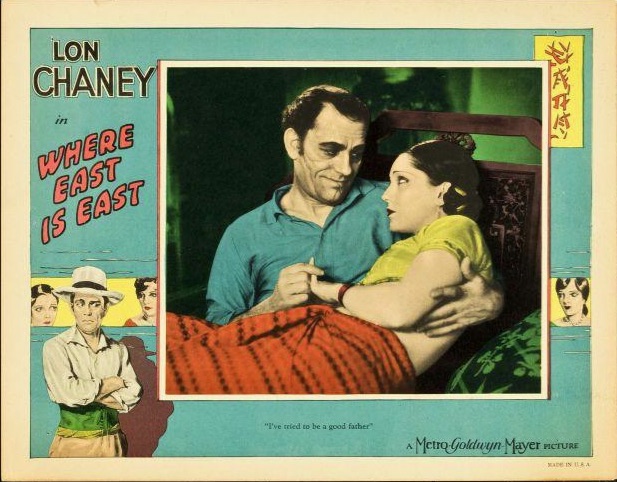
WARNING: SPOILERS
It’s a love story, and our young lovers, Toyo Haynes and Bobby Bailey (Lupe Velez and Lloyd Hughes), are together at the start. Meaning something will drive a wedge between them during the course of the movie. But what?
Initially, it’s the girl’s father, Tiger Haynes (Lon Chaney), a man who makes a living, and a good one, trapping wild animals in Indo-China for circuses, zoos, etc. He has the scars to prove it—not to mention the nickname. He objects to the union because he wants his daughter to be happy—that’s all he’s lived for—and he’s not sure Bobby is the man for the job. “I’m not trustin’ your happiness to any young whipper-snapper like that!” he tells Toyo via intertitles. Dropped g’s and all.
Then a tiger gets loose and Bobby protects Toyo. The father does most of the work restoring order but he appreciates Bobby’s bravery and the two men shake hands. Problem solved.
Except we’re 10 minutes in. So what comes between the lovers for the rest of the movie?
The girl's mother.
Ah. Same reason?
No. She wants Bobby for herself.
Ah.
Ew.
中文 101
Was this a regular thing back then? A wanton Chinese woman hypnotically seducing innocent western men? It's directed by Tod Browning, and parts reminded me of von Sternberg’s “Blue Angel”: the man reduced and in torment because of the awful woman and her wiles. She’s the nightmare from which he can’t wake up.
Something tells me Bobby would’ve been in trouble anyway. Shortly after the tiger attack, a pudgy Chinese woman flirts with him, until Toyo, who I suppose is supposed to be half Chinese (Velez herself is Mexican), tells her off via Chinese intertitles:
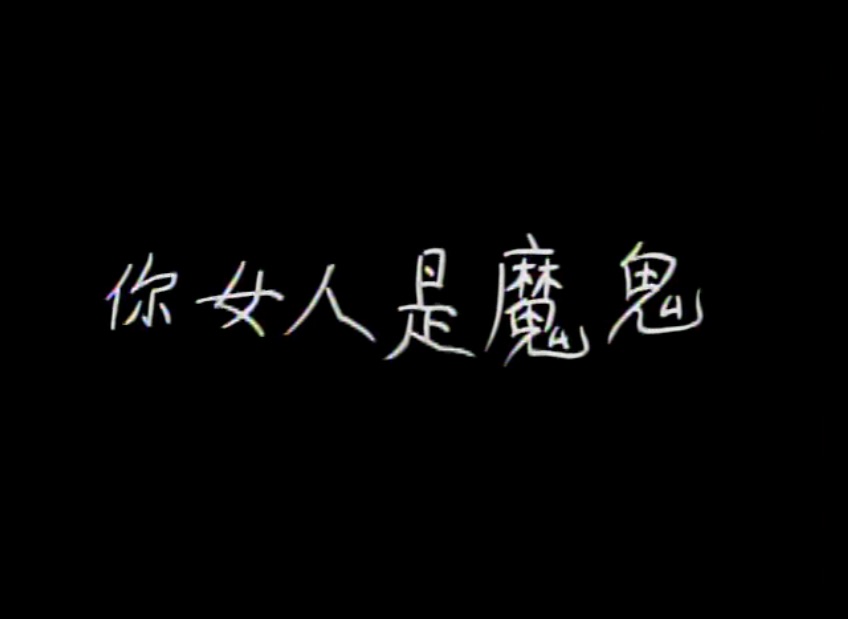
Was this a regular thing back then? UntranslatedChinese intertitles? Was it an early attempt to get into the Chinese market or just an attempt at verisimilitude—letting us know that these two people were saying things that Bobby, for example, didn't understand? If so, why not translate for the mostly western audience?
Here's my attempt anyway: For the above, I knew the first four characters (“You women are...”) but not the last two. Turns out it’s mo-gui: “devils.”
Bobby is passive during all this and it gets worse on a trip he takes with Tiger to deliver animals to Bobby’s father. On board the ship, a lounging woman in slinky outfit, known as Mme. de Sylva (Estelle Taylor), spies him, pushes a ball his way. He picks it up, sees the small boy to whom it belongs, comes over. But then he trips over the boy. Sign of stumbles to come.
At this point, via two more Chinese intertitles, we get this dialogue between the mother of the boy and Mme. de Sylva:
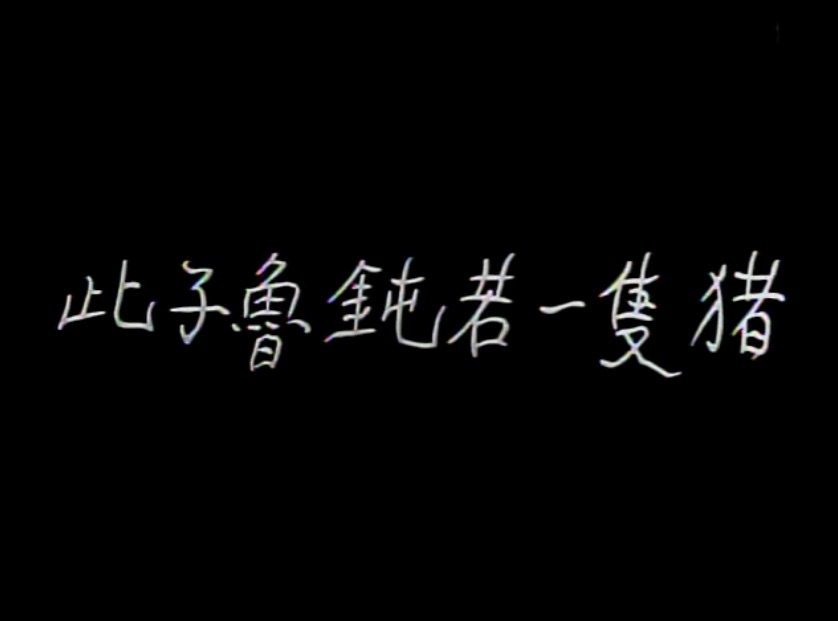

For these, I needed some help from my Chinese teacher. I didn’t know 隻 was the traditional form of the measure word for animals, for example. And in the reply, I didn’t know 莫 is a colloquial form of 别, meaning “don’t,” while 出聲, chu sheng, is “to utter sounds.” Basically the above is this:
Mother: This stupid child is like a pig.
Mme. de Sylva: You, don’t say anything.
That took me half a day. You‘re welcome.
Afterwards, Bobby spends more time with Mme. de Sylva, then introduces her to Tiger, who scowls angrily while she eyes him coolly. They obviously know each other, but when Tiger stomps off Bobby doesn’t go after him to find out how; he simply apologizes for Tiger’s behavior. Then we get more bad dialogue as the boat sails quietly on into the sleepy evening.
He: This is all like a poem of Kipling’s.
She: [Sidelong glance] My East will by our East. You will love it ... I promise.
Then they kiss. Now he’s hooked. Tiger has to literally knock him out and take him ashore to explain what he should have explained immediately: that Mme. de Sylva is ... Toyo’s mother. That wakes Bobby up. Both men agree to return home to Vien-Tiane, Laos, and never speak of it again.
Except guess who’s waiting for them? And even though Mom left her when she was young, Toyo’s super happy and literally hopping all over the place at the prospect. So what can Dad do? As for Bobby, he’s still hooked. Almost hypnotized. You know those Dragon Ladies.
We continue in this fashion: Mom seductive, Bobby tormented, Tiger angry, Toyo oblivious. A caged gorilla—who hates Mme. de Sylva because she used to torture him—is introduced in the second act, and it doesn’t take Chekhov to figure out what will happen in the third. That’s how Mom finally gets it. Cue close-up and silent scream. Tiger, who released the gorilla, is injured, perhaps fatally, in the assault, but he’s there in a makeshift wheelchair for the wedding, after which Toyo and Bobby limp off into what can only be a marriage of mutual recriminations or long sad silences.
Bobby: How could you have let your mother stay?
Toyo: How could you have wanted to fuck her!?!
In the end, Dad was right: He shouldn’t have trusted Toyo’s happiness to that whipper-snapper.
Who’s who
Chaney is great here. He exudes power and emotion while reigning it in. One understands why he was such a respected silent film actor. It’s a shame he only had another year to live before dying of throat cancer at age 47. This is his third-to-last film.
Lloyd Hughes? He made the transition to sound well enough, but stopped making movies in 1939. Not sure why.
The actresses, famous in their time, might be better known today for the men in their lives. Estelle Taylor married thrice, the second time to Jack Dempsey when he was still heavyweight champion of the world. Valdez married just once—to Tarzan himself, Johnny Weissmuller—but was linked to such a Who’s Who of masculinity as to make Taylor look like a piker: Tom Mix, Clark Gable, Gary Cooper, Guinn “Big Boy” Williams (a Texan character actor who looked like a bigger, stronger George W. Bush), Erich Maria Remarque, and boxers Jack Johnson and, hey, Jack Dempsey again. Why not? If she had a type, it wasn’t exactly Bobby Bailey. She was also apparently volatile and abusive. Cooper supposedly lost 45 pounds in nervous exhaustion during their relationship. She supposedly fired a pistol at him when he was trying to leave. Interestingly, Taylor was one of the last people to see Velez alive. In 1944, amid another volatile relationship, she committed suicide.
Of course, what none of these actors are, in this tale of Chinese seduction, is Chinese. That's truly where Hollywood is Hollywood.
All previous entries
Baseball's Active Leaders, 2023
What Trump Said When About COVID
Recent Reviews
Everything Everywhere All at Once (2022)
Black Panther: Wakanda Forever (2022)
Doctor Strange in the Multiverse of Madness (2022)
Spider-Man: No Way Home (2021)
The Cagneys
A Midsummer Night's Dream (1935)
Something to Sing About (1937)
Angels with Dirty Faces (1938)
A Lion Is In the Streets (1953)
Man of a Thousand Faces (1957)
Never Steal Anything Small (1959)
Shake Hands With the Devil (1959)







